University of Maryland School of Pharmacy Magazine for Alumni and Friends


University of Maryland School of Pharmacy Magazine for Alumni and Friends

The School of Pharmacy’s newest dean is ready to take the School into the future.
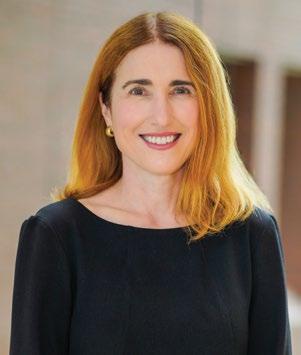
I have been at the University of Maryland School of Pharmacy (UMSOP) for my entire professional career, under the impactful leadership of previous deans David A. Knapp, PhD, and Natalie D. Eddington, PhD ’89, FAAPS, FCP. I have big footsteps to follow in and am excited to continue their legacies in my new role as dean.
After years of growth and expansion, UMSOP now trains students in a variety of health sciences disciplines in addition to training pharmacists via our hallmark PharmD program. We lead in pharmaceutical, biomedical, and outcomes research and rank in the top 10 for extramural research funding for pharmacy schools across the country. We train our students, regardless of their discipline, to be pharmapreneurs. Our students are innovative, creative “out of the box” thinkers who go on to lead in a multitude of careers.
As dean, one of my goals is to enhance our national leadership in training the pharmacists of the future so that our PharmD program continues to be recognized among the very best and moves into the top 5 in the national rankings. To achieve this, we have embarked on a curriculum reimagination process that brings together the innovative, pharmapreneurial, and paradigm-shifting work of our faculty to train our students to be at the top of the profession. This forward-thinking work will make the University of Maryland School of Pharmacy the place to go to become a leader in the pharmacy profession.
The profession itself has changed dramatically during the past few decades, making it a very exciting and innovative time. Our pharmacy practice faculty are driving the profession forward and embracing a pharmapreneurial mindset. They have far-reaching influence as the medication experts on health care teams at 24 practice sites, developing innovative practice models and championing community outreach programs that strengthen our West Baltimore neighborhood and beyond.
Another goal I have is to develop and support cutting-edge health science degrees at the forefront of graduate education. Our faculty are experts in a broad range of health sciences disciplines, and they have created a catalog of phenomenal MS programs at the School. As workforce needs change, my goal for us is to be nimble in developing new cutting-edge programs to respond to that demand, while we steward our existing programs.
A third goal is to grow our strong research enterprise via new strategic partnerships. I want us to be ranked in the top 5 for extramural research funding. We can achieve this by fostering strategic partnerships, seeking programmatic research grants in addition to supporting our successful single principal investigator model, and creating unique opportunities for our faculty, staff, and students through our exclusive Pharmapreneurship® initiative.
While serving as interim dean in 2023, I held listening sessions with many groups, which were helpful as I developed my vision for the School. As dean, I aim to lead the School of Pharmacy in excellence and ensure equity, diversity, inclusion, and belonging in all aspects of the School. I look forward to listening to and learning from all of you even more as dean. As I work to implement my vision, the counsel of the School of Pharmacy community will be invaluable.
Again, I am excited, humbled, and grateful to be dean of the University of Maryland School of Pharmacy.
With excitement and gratitude,
 Sarah L.J. Michel, PhD Dean and Professor of Pharmaceutical Sciences
Sarah L.J. Michel, PhD Dean and Professor of Pharmaceutical Sciences
OUR MISSION:
The University of Maryland School of Pharmacy globally engages and leads education, pharmacy practice, scientific research, and pharmapreneurial initiatives to collaboratively and equitably improve the health of society.
OUR VISION:
The University of Maryland School of Pharmacy is internationally recognized for:
• empowering learners and graduating visionary leaders
• pioneering social impact and business innovation through pharmapreneurship
• listening to all voices to equitably enrich the lives of our internal and external communities
• positively influencing the delivery of convenient and affordable health care
• leveraging pharmaceutical expertise and relentlessly collaborating to solve scientific, clinical, and social problems that matter to all citizens of the world
OUR VALUES:
We embrace a culture that embodies the University of Maryland, Baltimore’s core values:
• Respect and Integrity: We value each other and hold ourselves accountable for acting ethically and transparently using compassion and empathy.
• Well-Being and Sustainability: We care about the welfare of our people, planet, communities, and University.
• Equity and Justice: We embrace and are committed to diversity, and we value inclusive and just communities. We oppose racism and oppression in all its forms.
• Innovation and Discovery: We imagine and explore new and improved ways to accomplish our mission of education, research, clinical care, and service.

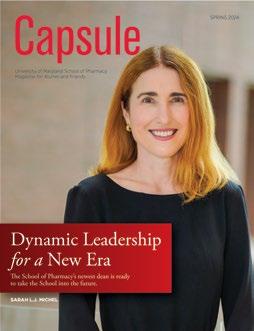


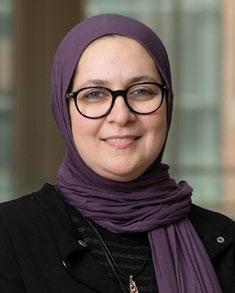
In February, Danya Qato, PhD, PharmD, MPH, was named the University of Maryland, Baltimore’s (UMB) 2024 Rev. Dr. Martin Luther King Jr. Diversity Recognition Award winner for outstanding faculty member. It’s a fitting honor for the School of Pharmacy (SOP) associate professor, who says Dr. King’s words and deeds have inspired her commitment to promoting health equity and justice.
“In his remarks to the Medical Committee for Human Rights in 1966, Dr. King said: ‘Of all the forms of inequality, injustice in health is the most shocking and inhuman,'” said Qato, who is a faculty member in the Department of Practice, Sciences, and Health Outcomes Research (P-SHOR). “This sentiment has helped animate my commitment both as a scholar and as an advocate to doing whatever I can to make sure everyone — everywhere — has access to quality health care as a human right.”
She also mentions King’s commitment to justice as a driving force during her 20-year career as a pharmacist, epidemiologist, and health services researcher.
“Dr. King affirmed that it is our moral responsibility to help create more just systems and to dismantle unjust ones,” Qato said. “This is true when it comes to health care and other areas of our lives.”
Qato, who holds a secondary appointment in the School of Medicine’s (SOM) Department of Epidemiology and Public Health, has been involved in numerous efforts to advance health equity and justice since she arrived at UMB in 2016 after serving one year as a Fulbright Scholar at the Institute for Community and Public Health at Birzeit University in her native Palestine.
She is faculty advisor to the School’s student chapter of the Maryland Public Health Association, regularly lecturing on topics related to health equity. She served on the Graduate School’s Strategic Plan Committee, whose objective was to “cultivate a culture of equity, diversity, inclusion, and social justice.” She embedded modules on structural racism and health equity into foundational classes such as Health Policy at SOP and Epidemiology at SOM. And, as director of the Pharmaceutical Health Services
Research (PHSR) graduate program from 2018 to 2023, Qato founded and led a book club for students focused on equity in health services research and public health.
“The book club, which ran for four years, fostered healthy discussions within the department about the role of racism, ableism, sexism, and other forms of discrimination in shaping our research and in shaping health outcomes,” said Jill Morgan, PharmD, BCPS, BCPPS, FNAP, professor and chair of P-SHOR, who nominated Qato for the Diversity Recognition Award. “It has also helped elucidate the active role we can play as researchers and advocates in improving health equity.”
Qato has been a frequent speaker across UMB at events highlighting equity and justice, including an Intercultural Center panel in honor of World Hijab Day, the School of Dentistry’s Women’s Health Equity panel, and an episode of “Virtual Face to Face with President Bruce Jarrell” about the Supreme Court’s decision to overturn Roe v. Wade. She also served as a guest speaker for SOM’s Social Justice in Medicine program, where she discussed the topic of “Access to Essential Medicines.”
As a testament to her commitment to equity, she was awarded a Robert Wood Johnson Foundation Culture of Health Leader Award in 2020. In 2023, she won a Faculty Teaching Award from SOM for her course Principles of Epidemiology. And Morgan noted that under Qato’s leadership, the number of applications for the SOP PhD in PHSR program rose from an average of 40 per year to more than 100 while attracting a more diverse cohort of students.
“Dr. Qato led the graduate program during the very difficult COVID-19 years and was instrumental in ensuring that students’ well-being was addressed during the pandemic,” Morgan said. “She singlehandedly organized a care package to be sent to the home of every student, a gesture that was most welcome as students felt the weight of social isolation during the pandemic.”
Regarding the Diversity Recognition Award, Qato said she was heartened to see that her commitment to equity and justice was being honored.
“Truthfully, I would still be doing this work — collectively with others — even without the recognition because I am passionate about using my time on Earth to make it a more just place,” she said.
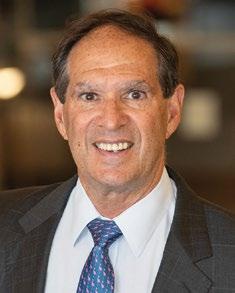
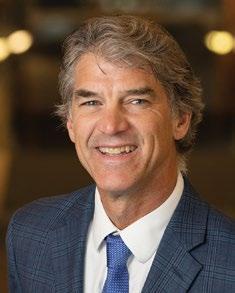
When Jeffrey Hasday, MD, invited Paul Shapiro, PhD, to the University of Maryland Inflammation Research Group (IRG) weekly seminar about 10 years ago, the resulting encounter was what Hasday calls “a Reese’s Peanut Butter Cup moment” — a nod to the famous 1970s TV commercials where chocolate meets peanut butter to produce a great new taste.
In the case of Hasday and Shapiro, two great research teams met, resulting in an impactful, cross-disciplinary collaboration that aims to discover new approaches to fight inflammatory disease.
Shapiro, professor in the Department of Pharmaceutical Sciences and associate dean for research at the School of Pharmacy (SOP), was working on developing novel drugs that target a class of enzymes called kinases — specifically ERK mitogen-activated protein kinases (MAPK) that are important in cancer. They instruct cells to perform certain functions and are implicated in many diseases.
Hasday, the Dr. Herbert Berger Professor of Medicine and division head, pulmonary and critical care medicine at the School of Medicine (SOM), was working on the role of a related enzyme called p38 MAPK in acute respiratory distress syndrome (ARDS), a lung disease with high mortality and few available treatments.
“We used Paul’s strategy for ERK inhibitors to develop a new class of p38 inhibitors, and it seems to work,” Hasday said of the collaboration, which is exactly what IRG is set up to do — facilitate the exchange of ideas across disciplines.
Now, a decade later, Hasday and Shapiro are co-inventors of technology that is focused on treatments for inflammatory diseases, including ARDS, and has been licensed to GEn1E Lifesciences, a biotech company based in Silicon Valley. For their discovery, they were named the University of Maryland, Baltimore’s (UMB) 2023 David J. Ramsay Entrepreneurs of the Year. Ramsay, DM, DPhil, was UMB’s president from 1994 to 2010 with a particular focus on entrepreneurism and creating the University of Maryland BioPark.
Hasday and Shapiro worked to develop compounds to target inflammatory processes — with funding from UM Ventures, which is UMB’s tech transfer arm, and the UMB Institute for Clinical and
Translational Research — and their research team discovered a novel class of drugs that selectively inhibits the function of p38 MAPK that promotes disease-causing inflammation but preserves its beneficial functions. Previous approaches to target this enzyme had been unsuccessful because the drugs that had been developed turned off the enzyme, which blocked its beneficial effects and caused unwanted toxicity.
“Many kinases have diverse functions, some of which are involved in disease and others that are beneficial for normal cell functions,” said Shapiro, who has been at SOP since 1999. “Most drugs that have been developed to block kinases in disease turn off the kinase completely, which limits their therapeutic benefits. Our drug discovery program demonstrates that it may be more beneficial to tweak the function of the kinase rather than turn it off so we can selectively eliminate the disease-causing activity and preserve the beneficial functions.”
GEn1E Lifesciences purchased exclusive rights to the therapeutics, known as the p38α mitogen-activated protein kinase inhibitor program. The company hopes the therapeutics will help its efforts to combat ARDS, which kills 40 percent of the people that contract it due to excess lung inflammation.
“Through their multidisciplinary research, Drs. Hasday and Shapiro have developed several very creative and innovative compounds,” said James L. Hughes, MBA, UMB’s senior vice president and chief enterprise and economic development officer. “They worked to identify potential commercial partners for their technologies and found a great partner in GEn1E Lifesciences, a biotech startup led by Dr. Ritu Lal, an alum from our School of Pharmacy. Now, several years later, this close partnership is helping move more of Drs. Hasday’s and Shapiro’s ideas out of the lab and into the marketplace.”
Shapiro and Hasday said working with GEn1E Lifesciences has allowed their research to be put into clinical trials faster. “We have gone from discovery to Phase II clinical testing in six years,” Hasday said. “I believe that is much faster than if we had gone the startup company route.”
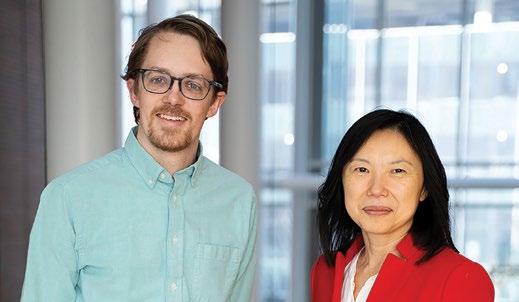
A research team in the Department of Pharmaceutical Sciences (PSC) at the School of Pharmacy (SOP) is investigating the science behind SARS-CoV-2, the virus that causes COVID-19, and therapeutics to treat it.
A publication in the Journal of Chemical Information and Modeling, led by Jana Shen, PhD, professor of PSC and co-director of the Computer-Aided Drug Design Center, looks at nirmatrelvir, better known by its trade name Paxlovid, an antiviral drug approved by the U.S. Food and Drug Administration (FDA) to treat mild to moderate COVID-19.
“There has been an incredible amount of research in the last few years to understand COVID-19 and how to treat it,” Shen said. “In order to optimize the therapeutics for this constantly evolving disease, we have to understand the basic science behind it and how drugs interact with the disease.”
Joseph Clayton, PhD, now an ORISE fellow with the FDA, and Vinicius Martins de Oliveira, PhD, now a postdoctoral fellow at Eli Lilly and Co., also collaborated on the research as part of the Shen lab.
Paxlovid works by inhibiting the main protease (Mpro), an enzyme that helps in protein production, of SARS-CoV-2.
Studies have found a rare mutation of Mpro significantly reduced the effectiveness of Paxlovid, and the Shen-led team sought to understand why.
Clayton and Martins de Oliveira started by creating the computational models of the mutant and regular Mpro bound to Paxlovid that allowed them to investigate Mpro on an atomistic level.
“In a way, our approach in using computational models acts as a powerful microscope where we can both verify results found in experimental labs and reveal details down to individual atoms,” Clayton said.
The researchers conducted molecular dynamic simulations to see the various configurations Mpro could adopt, both in the mutant and regular forms. Next, the Shen lab fed this data into an artificial neural network to detect changes between mutant and regular Mpro. The mutant Mpro showed subtle but consistent changes in an important region called the oxyanion loop that is targeted by nirmatrelvir, which is what the Shen lab believes leads to the decreased effectiveness of the drug.
“This approach leveraging our expertise in computer-aided drug design and simulating different mutations of Mpro provides incredible insight into those interactions,” Shen said. “Ultimately we think this research will help drugmakers in understanding how to best design Paxlovid for the current mutations in the virus and could serve as a model for investigating mutation effects on other protein drug targets.”
This work was completed in collaboration with Rolf Hilgenfeld’s group at the University of Lübeck, Germany, whose findings confirmed the Shen lab hypothesis, and was supported by the National Institutes of Health.
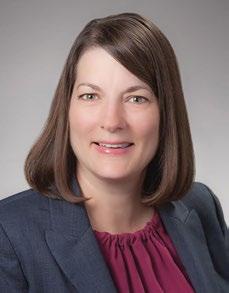
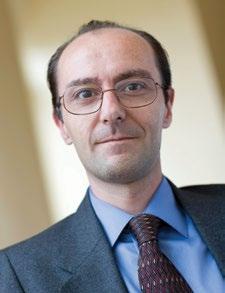
The School of Pharmacy (SOP) has two new associate deans. Agnes Ann Feemster, PharmD, BCPS, associate professor of practice, sciences, and health outcomes research, has been named associate dean for academic affairs. Andrew Coop, PhD, professor of pharmaceutical sciences (PSC), has been named associate dean for graduate programs. Feemster will provide oversight of the Doctor of Pharmacy (PharmD) curriculum with a focus on continuous improvement to meet the needs of today’s students and the pharmacy profession.
A faculty member since 2014 and medication safety officer at Johns Hopkins Hospital, Feemster has more than 15 years of clinical, leadership, and management experience in health-system pharmacy practice at large teaching hospitals. Before joining SOP, Feemster served as interim
Continued on Page 5
Continued from Page 4
director of pharmacy at the University of Maryland Medical Center and assistant director of clinical pharmacy, investigational drug, and central production services. She leads the School’s pharmacy practice management and health-system pharmacy course.
She previously served as assistant dean for experiential learning for eight years and was the recipient of the 2021 W. Arthur Purdum Award from the Maryland Society of Health-System Pharmacy.
Coop, on faculty at SOP since 1999, previously served as associate dean for academic affairs, interim associate dean for graduate programs, and chair of PSC from 2007 to 2015.
Coop is a fellow of the American Association of Pharmaceutical
Scientists and the College on Problems of Drug Dependence. He is a past chair of the American Association of Colleges of Pharmacy’s (AACP) Chemistry Section and is current chair of AACP’s Graduate Education Special Interest Group. He is a recipient of AACP’s Wynn Award for Teaching Excellence from the Chemistry section and was the 2019 Maryland Chemist of the Year.
As associate dean for graduate programs, Coop will oversee certificate, MS, and PhD programs, stewarding and assessing current programs, and identifying and developing new programs. He will work with faculty academic program directors and staff to support recruitment, admissions, student affairs, and career development.
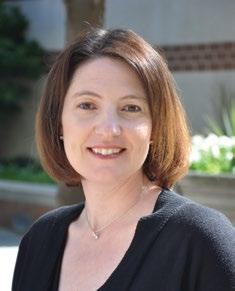
The University of Maryland, Baltimore (UMB) announced in November the appointment of Heather Congdon, PharmD, CACP, BCPS, CDE, professor in the Department of Practice, Sciences, and Health Outcomes
Research at the School of Pharmacy, as director of the University Center for Interprofessional Education.
As the role of pharmacists has evolved over time — with a focus on chronic disease management, as opposed to medication dispersion alone — the interprofessional model has become more important than ever.
“As a pharmacist, I’m the medication expert. But I have always felt like there was so much more I could offer patients than just help with their medications,” said Congdon, who has focused on interprofessional education (IPE) since the beginning of her career. “Patients benefit so much from different disciplines working collaboratively together as a team — their care is significantly enhanced from that interaction and ultimately, their clinical outcomes improve dramatically. Students participating in IPE teams that provide collaborative care are learning with, from, and about the other disciplines, thus preparing them to work efficiently and effectively in teams upon graduation.”
The Center for Interprofessional Education began in 2013 under former UMB President Jay A. Perman, MD, now chancellor of the University System of Maryland (USM).
“There’s no better choice for center director than Dr. Congdon,”
said Perman. “I don’t know anyone more knowledgeable about interprofessional education — anyone with more expertise in how to do IPE well or a better appreciation of its significant benefits for our patients and our colleagues when we get it right.”
Jane M. Kirschling, PhD, RN, FAAN, the former Bill and Joanne Conway Dean of the School of Nursing at UMB, led the center before retiring in 2023.
Congdon has multiple goals for her new role, like a new “registry,” which will live online and allow internal and external audiences to find all IPE opportunities available at UMB in one location. This work comes from a partnership with Texas Tech University, which has allowed UMB to use its software to create this database.
Congdon is also in the early stages — thanks to USM’s Elkins Professorship — of bringing an IPE digital badging system to UMB, which will create several badges based on the Interprofessional Education Collaborative competencies that students will be able to add to their portfolios.
Previously co-director of the center, Congdon is joined in her new role by three co-directors, two of whom are new to their position.
Linda B. Horn, PT, DScPT, MHS, director for academic affairs and assistant professor in the School of Medicine (SOM) at UMB, Department of Physical Therapy and Rehabilitation Science, and Bridgitte Gourley, DNP, FNP-BC, director for the Family Nurse Practitioner specialty and assistant professor in the School of Nursing, have been named new co-directors. They will work alongside current co-director Joseph P. Martinez, MD, associate dean for medical education and student experience and associate professor of emergency medicine at SOM.

A faculty member at the School of Pharmacy (SOP) has received a lifetime achievement award from his peers at the International Society of Pharmacometrics (ISoP).
Joga Gobburu, PhD, MBA, FCP, a professor in the Department of Practice, Sciences, and Health Outcomes Research and director of the Center for Translational Medicine (CTM), received the Lewis B. Sheiner Lecturer Award, the highest recognition from ISoP, in November at the society’s annual meeting at the National Harbor in Maryland.
The Sheiner award recognizes the outstanding lifetime achievements of a distinguished scientist or researcher who has continued the legacy of excellence in pharmacometric research and leadership established by Sheiner, MD, PhD, the father of the “learn and confirm” paradigm of drug development, who is internationally recognized for his work in pharmacokinetic and pharmacodynamic modeling and simulation. It was established in 2008 to honor the memory of Sheiner, who died in 2004.
Gobburu joined the faculty at the School of Pharmacy in 2012, when he also founded the MS in Pharmacometrics program to
meet an industry demand for decision-making pharmcometricians and quantitative translational scientists. The program has now graduated more than 180 students. Throughout his career, Gobburu has been keenly interested in training and mentoring the next generation of pharmacometricians.
Through his work with CTM, Gobburu is engaged in an ambitious research collaboration led by the University of Maryland School of Medicine aiming to create an artificial, shelf-stable blood product.
In addition to his academic responsibilities, Gobburu is the co-founder and CEO of Pumas-AI, a company that focuses on predictive health care analytics and strategic and scientific consultancy to accelerate drug development. He also is president of Vivpro Corp., which developed an AI-based research and development intelligence software.
Before joining SOP, Gobburu worked at the U.S. Food and Drug Administration in the Office of Clinical Pharmacology, where he helped establish the Division of Pharmacometrics in 2007.
“I am humbled to receive this highest honor from ISoP for my lifetime contributions, and my thoughts turn to the heart of our work — the patients,” Gobburu said. “My professional journey is defined by empowering scientists to do what they are best at.”
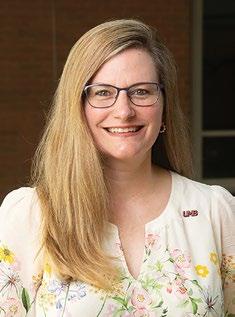
For a year, Jill Hamilton, MSW, attended the University of Maryland, Baltimore’s (UMB) Employee of the Month meetings as a member of the UMB Staff Senate, cheering on colleagues from across the University and their many accomplishments.
In August, it was Hamilton’s turn to be recognized. UMB President Bruce E. Jarrell, MD, FACS, surprised the contracts and grants specialist from the School of Pharmacy (SOP), whose term as vice president of the Staff Senate ended last summer, with the news that she was UMB’s August Employee of the Month. He was joined on the videoconference by Hamilton’s SOP colleagues and many members of the Staff Senate who nominated her for the award.
“I had the pleasure of reading your nomination, and a whole lot of people chimed in singing your praises, and you’re certainly deserving of this award,” Jarrell told Hamilton.
In her role at the School of Pharmacy, Hamilton ensures that the post-award process goes smoothly for faculty in the Department of Practice, Sciences, and Health Outcomes Research (P-SHOR).
“I do the monitoring and the due diligence with making sure we are spending funds correctly, meeting the deadlines of the sponsors, and keeping our faculty informed of the grant progress on the postaward side,” Hamilton said.
She said one of her favorite things about her job is making sure grant sponsors pay invoices, which requires persistence and being deadline-oriented.
Hamilton’s supervisor, Megan Young, accounting director of P-SHOR, praised her teamwork.
“She really hit the ground running here on campus,” Young said of the five-year employee. “And she’s just grown and done wonderful things all across the department and campus. I’m so grateful I get to
Continued on Page 7
Continued from Page 6 work with her every day.”
Hamilton said she feels like she makes a difference in her SOP role.
“All these little things matter in the puzzle of creating grants and getting the grants. I support the work, so I’m doing good for the world,” she said.
Shortly after Hamilton started working at UMB, she decided to become involved with the Staff Senate. During her tenure from 2019 to 2023, she was a senator, member at large, secretary, and vice president.
“Shared governance is real on our campus with our president and our leaders,” she said. “Because we advocate, it doesn’t mean they’re going to change everything, but they do listen. You may not get what you want, but they are listening to the concerns and doing the best they can for our staff.”
Hamilton is serving as a co-chair for the Employee Well-Being Committee on the Future of Work Task Force. She also served on the yearlong Core Values Implementation Planning Committee, which is fitting since many of her colleagues said that she truly embodies the University’s core values.
“I’m really excited to have won the award. We work with phenomenal people who do phenomenal things,” she said. “I’m in the company of amazing, hard-working staff. I feel honored to be a part of people who improve the human condition. If I can make it so people get their grants and they get more funding, and it makes it so something can be discovered and help make the world a better place to be, I’m in.”
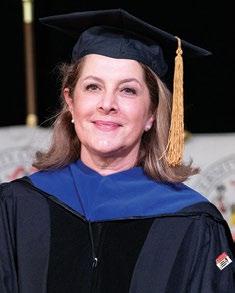
Fadia T. Shaya, PhD, MPH, a professor in the Department of Practice, Sciences, and Health Outcomes Research at the School of Pharmacy, has been recognized as a Distinguished University Professor by the University of Maryland, Baltimore (UMB), the highest appointment bestowed on a faculty member at the University. She is one of eight faculty recipients among the UMB schools.
Shaya, a tenured professor and population health and data science expert, is executive director of the School of Pharmacy’s Behavioral Health Resources and Technical Assistance Program, which focuses on statewide prescription drug misuse prevention efforts covering all Maryland jurisdictions, helping local health departments in needs assessment, capacity building, strategic planning, implementation, and evaluation. She has mentored hundreds of Doctor of Pharmacy (PharmD) and PhD students, and postdoctoral fellows, and teaches in the School’s PharmD, graduate, and MS in Regulatory Science programs. She also is co-director of the informatics core and director of the innovation, dissemination, and implementation core in UMB’s Institute for Clinical and Translational Research.
Shaya has built capacity to develop agile technology systems to derive real-time evidence using artificial intelligence and machine learning. Her research leverages multi-source data to support clinical trials and stakeholder engagement, including health systems, patient, and provider groups as well as regulators and payers. Her research models link clinical, social, environmental, and behavioral data. She has experience developing comparative effectiveness research, clinical, economic, policy, decision analytic and budget impact models. Her research lab has been continuously funded externally
from state, federal, nonprofit, and industry sources.
“This is truly a humbling honor,” says Shaya. “This award is a celebration of UMB’s collective and vibrant academic environment. One that enables the pursuit of excellence in research and discovery, that supports service to the profession and the diverse communities we serve, and that fosters innovation and leadership. I am deeply grateful to my students, trainees, staff, fellow faculty members, the School of Pharmacy, and University leadership, as well as my colleagues inside and outside UMB. They are a source of strength and inspiration.”
Shaya is an elected member of the board of directors at AcademyHealth, serves on National Institutes of Health and the Agency for Health Care Quality and Research study sections, and is a past board member of the Quality Health Foundation and the Delmarva Foundation. She serves on numerous editorial advisory boards and is a referee for peer-reviewed journals, reviewing over 500 papers and federal grants applications and publishing more than 250 papers. She regularly presents research at national and international conferences and scientific and policy meetings.
At the School of Pharmacy since 2002, Shaya obtained her PhD from the Johns Hopkins University Bloomberg School of Public Health, her doctoral health economics degree from the Sorbonne University Paris-IX Dauphine in France, and her master’s in public health and BSc in biology and chemistry from the American University of Beirut in Lebanon.
She completed postdoctoral training at the University of Maryland School of Pharmacy and CareFirst BlueCross BlueShield, and a research and academic leadership program at the American Association of Colleges of Pharmacy. She is an alumna of the Harvard Business School and of the Massachusetts Institute of Technology Sloan School of Management. Shaya also holds the Distinguished Alumna Award from the Johns Hopkins University Bloomberg School of Public Health and in 2017 was named UMB’s Founders Week Teacher of the Year.
The U.S. Food and Drug Administration’s Office of Minority Health and Health Equity (FDA OMHHE) has awarded a $500,000 cooperative agreement to the PATIENTS Program at the University of Maryland School of Pharmacy in partnership with Mount Lebanon Baptist Church and two historically black colleges and universities.
The Racial and Ethnic Minority Acceleration Consortium for Health Equity focuses on advancing minority health and health equity-focused research, outreach, and communications as well as supporting the training and mentoring of students, fellows, and researchers from diverse communities.
“Our project’s focus is to advance equity in clinical trials research and to promote equity in voices by engaging the communities we serve,” said Claudia Baquet, MD, MPH, a member of the PATIENTS Program steering committee. “Being included in this important and novel consortium to accelerate health equity and health disparities research and solutions is as important as it is exciting.”
The consortium’s two-prong approach will focus on advancing minority health and health equity-focused research, outreach, and communications. It also will support training and mentoring of health professions students, fellows, and researchers at the two historically black partner colleges and universities: Coppin State University’s Helene Fuld School of Nursing and College of Health Professions in Baltimore and Xavier University of Louisiana College of Pharmacy in New Orleans.
“Being part of the FDA OMHHE Racial and Ethnic Minority Acceleration Consortium for Health Equity provides the opportunity for our advanced practice and doctoral students to participate in initiatives aimed at advancing minority health and health equityfocused research, outreach, and communications. The project will be an excellent model of the efficacy and need for interdisciplinary collaborative practices,” said Joan Sylvia Tilghman, PhD, RN, CRNP, WHNP-BC, CNE, interim dean of the College of Health Professions at Coppin State.
The first phase of this project will develop a piloted curriculum for pharmacy and nursing advanced students and faculty at Coppin and Xavier.
In Phase 2, the pilot project and program will be implemented and will support ongoing activities that work to expand and reinforce outreach for FDA OMHHE’s community engagement and
communications with historically underserved members of the public.
“I am critically aware of the breadth of health disparities and inequities in racial and ethnic minority patients, families, and communities. Participation with the University of Maryland School of Pharmacy on the FDA OMHHE Racial and Ethnic Minority Acceleration Consortium for Health Equity has the potential to address longstanding disparities and inequities through training and mentoring for HBCU pharmacy and students, fellows, and faculty and through community engagement of Black or African American communities,” said Kathleen Kennedy, PharmD, Malcolm Ellington Professor of Health Disparities Research and dean of the College of Pharmacy at Xavier University of Louisiana.
Mount Lebanon Baptist Church’s role will be to work with the community to develop evidence-based strategies to address barriers to clinical trial diversity. This will help increase transparency and trustworthiness in sponsors and researchers and increase willingness to participate in trials for African Americans.
The initial stakeholder focus will be on Black or African American residents in the Baltimore metro region and in rural areas and small towns in Southern Maryland and on health professions students in Maryland and New Orleans. By the second year, the goal is to expand the population and geographic focus to underrepresented communities throughout the rest of the United States.
“The important focus on engagement of Black or African American communities and others in pilot research is significant to define how to address trustworthiness and transparency concerns that impede diversity and inclusion of Black or African Americans and others in clinical trials,” Kennedy added. “Our partnership on training and community engagement aspects of the cooperative agreement will provide the potential for acceleration of health equity research and actions that will result in tangible benefits to communities, in science, and the nation.”
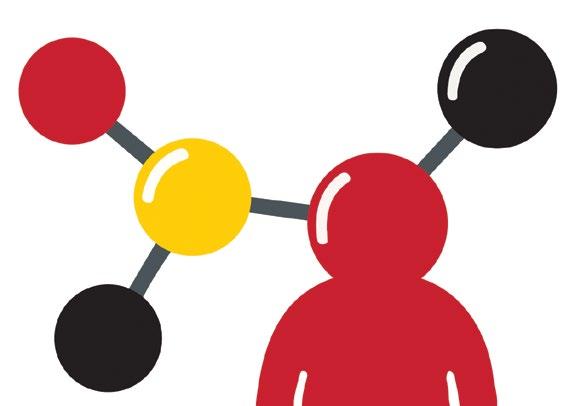
Catherine Cooke, PharmD, MS ’18, BCPS, PAHM, was selected by the Pharmacy Quality Alliance to serve a three-year term on its Quality Metrics Expert Panel
Sandeep Devabhakthuni, PharmD, BCCP, has been elected director-at-large of the Section of Inpatient Care Practitioners for the American Society of Health-System Pharmacists.
Susan dosReis, BSPharm, PhD ’99, has been appointed to a Maryland Department of Human Services and Maryland Department of Health statewide advisory task force on oversight and monitoring of psychotropic medications.
Natalie D. Eddington, PhD ’89, FAAPS, FCP, received the American College of Clinical Pharmacology Hartmut Derendorf Mentorship in Clinical Pharmacology Award.
Mojdeh Heavner, PharmD ’08, BCPS, BCCCP, received several appointments and honors from the Society of Critical Care Medicine:
• elected secretary-treasurer for the Clinical Pharmacy & Pharmacology Section.
• appointed vice chair for the Leadership, Empowerment, and Development Committee.
• appointed as a panel member developing the Guidelines for Sustained Neuromuscular Blockade in the Adult Critically Ill Patient.
• awarded the Presidential Citation. In addition, she has been named a fellow of the American College of Clinical Pharmacy and received the MVP Award from “Pharmacy to Dose – The Critical Care Podcast.”
Emily Heil, PharmD, MS, BCIDP, BCPS-AQ ID, AAHIVP, has been named a fellow of the Society of Infectious Diseases Pharmacists and has been appointed to the Infectious Diseases Society of America’s Guidance on the Treatment of Antimicrobial Resistant Gram-Negative Infections panel.
Amy Kruger Howard, PharmD ’17, MS ’21, was selected as a 2023-2025 University of Maryland, Baltimore Interprofessional Education Scholar.
Chad Johnson, PhD ’19, has been appointed by Maryland Gov. Wes Moore to the Governor's Advisory Board for Medical/ Adult-use Cannabis.
Kaitlin Landolf, PharmD, BCCCP, has been named president of the Baltimore chapter of the Society of Critical Care Medicine.
Cherokee Layson-Wolf, PharmD ’00, BCACP, FAPhA, received the Daniel B. Smith Practice Excellence Award from the American Pharmacists Association (APhA).
Lisa Lebovitz, JD, MS ’21, is a member of a team selected to receive the Rufus A. Lyman Award from the American Association of Colleges of Pharmacy (AACP) for the best paper published in the American Journal of Pharmaceutical Education in 2023.
Raymond Love, PharmD ’77, BCPP, FASHP, was appointed by the Maryland Secretary of Human Services to a statewide advisory task force on psychotropic medication use in foster care youth.
Mary Lynn McPherson, PharmD ’86, PhD, BCPS, has been appointed to an International Association of Hospice and Palliative Care panel to determine essential medications in hospice and palliative care for worldwide use. She also received the 2024 Hospice and Palliative Nurses Association Champion Award.
Michelle Medeiros, MS, MA, CCRP, has been appointed to a three-year term on the Patient Centered Outcomes Research Institute’s Advisory Panel on Clinical Trials.
Sarah L.J. Michel, PhD, has been named an Innovation Fellow by the Universities at Shady Grove as part of its new Joann Boughman Innovations Fellows Program.
James Polli, PhD, received the 2024 Takeru Higuchi Research Prize from the APhA. Polli also was selected to receive the Volwiler Research Achievement Award from AACP.
Magaly Rodriguez de Bittner, PharmD ’83, FAPhA, FNAP, has been appointed to the Maryland Department of Health’s Primary
Care Program Transformation Advisory Board and is a candidate for president-elect of APhA.
Leah Sera, PharmD ’10, MA, BCPS, has been appointed vice chair of academic affairs in the Department of Practice, Sciences, and Health Outcomes Research.
Paul Shapiro, PhD, has been named a top reviewer by the Journal of Biological Chemistry
Fadia T. Shaya, PhD, MPH, has been named a fellow of the American Medical Informatics Association.
Julia Slejko, PhD, was appointed to the Scientific Advisory Board for the Center for Evaluation of Value and Risk in Health Cost-Effectiveness Analysis Registry at Tufts Medical Center and was appointed as an associate member of the Population Science Program at the University of Maryland Marlene and Stewart Greenebaum Comprehensive Cancer Center.
Paul Solinsky, PharmD, BCACP, AE-C, is a member of a transitional care team at the University of Maryland Baltimore Washington Medical Center that received the Circle of Honor distinction from the Maryland Patient Safety Center. He also received the 2023 Health System Pharmacist of the Year Award from the Maryland Society of Health-System Pharmacists and obtained the asthma educator credential (AE-C).
Sheryl Thedford, PharmD ’11, was reappointed to a two-year term on the Psychiatric Specialty Council of the Board of Pharmacy Specialties.
Hongbing Wang, PhD, and Fengtian Xue, PhD, received a U.S. patent for “CAR Activator Agents for CyclophosphamideBased Treatments of Cancer.”
Zafar Zafari, PhD, has been appointed by Maryland Gov. Wes Moore to a three-year term on the Maryland Aviation Commission.
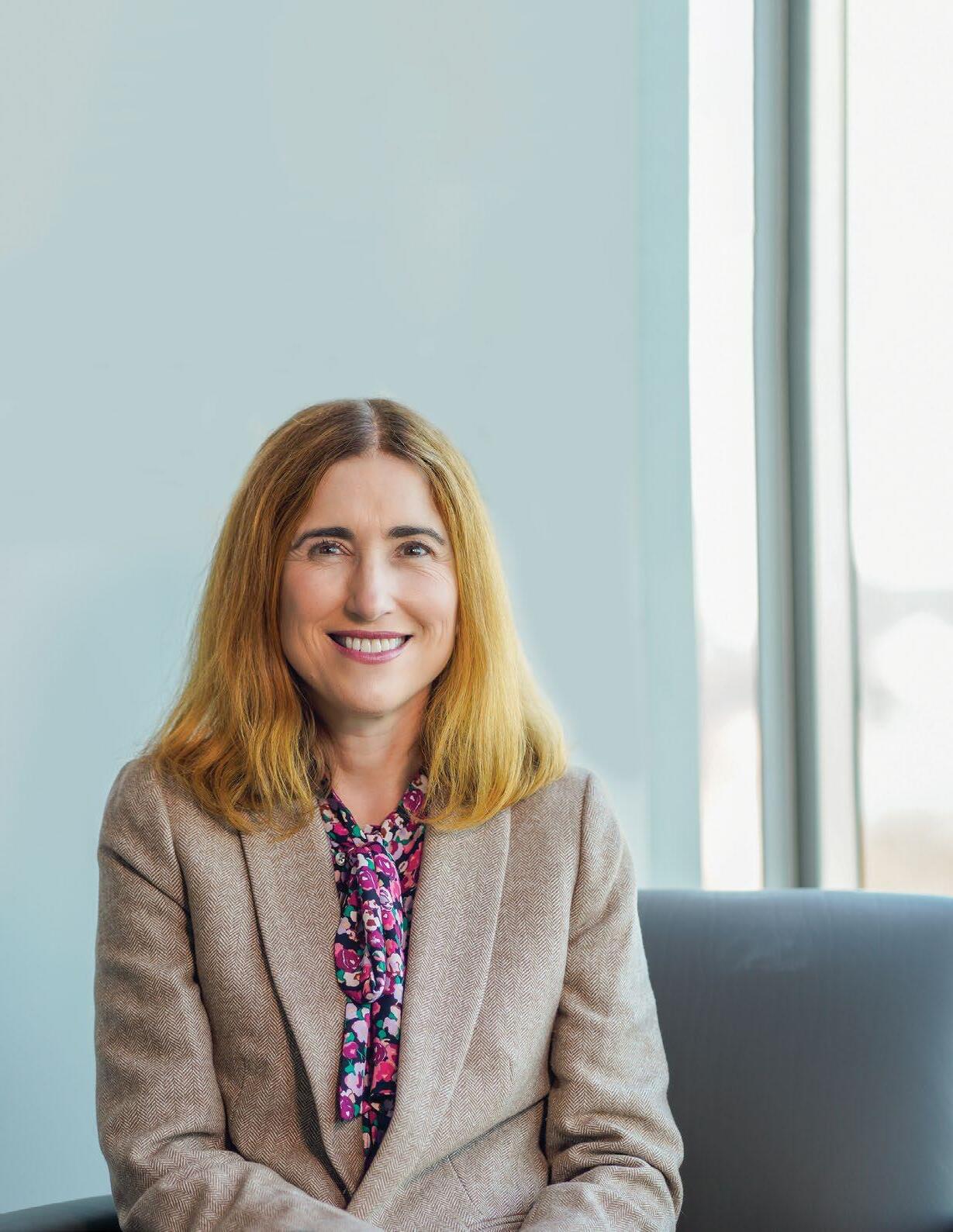
The School of Pharmacy’s newest dean is ready to take the School into the future.
BY CHRISTIANNA MCCAUSLAND Sarah L.J. Michel
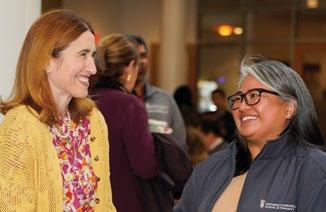

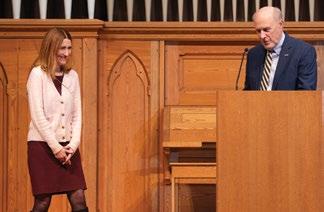
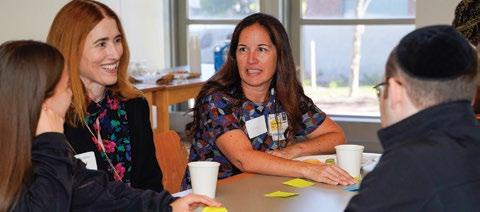
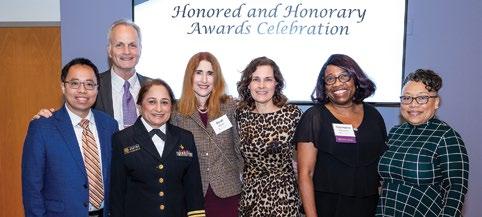
Last October, Sarah L.J. Michel, PhD, was appointed dean of the University of Maryland School of Pharmacy (UMSOP), following a fourmonth interim appointment after Natalie D. Eddington, PhD ’89, FAAPS, FCP, stepped down in June.
Becoming dean is the capstone of an academic career spent entirely at the School, where Michel has been involved in everything from research and academic program development to student initiatives and Universitywide governance. She will now oversee a dynamic moment in pharmacy and health sciences education where the School will continue to grow and evolve to train pharmacy leaders, researchers, practitioners, policymakers, influencers, and pharmapreneurs of tomorrow.
“Dean Michel brings a lot of energy and knowledge to the table, is full of ideas and has executed them in the past,” says Bruce E. Jarrell, MD, FACS, president of the University of Maryland, Baltimore (UMB). Jarrell continues that Michel has the vision and capacity to structure the School so it will continue to be a national leader in pharmacy education. “I believe she will define the pharmacist of the future and the pharmacy educational program needed to educate them.”
Michel has spent nearly 19 years at the School, leading her to develop a unique and in-depth perspective on pharmacy education. Throughout her tenure she has been chair of the Department of Pharmaceutical Sciences (PSC), associate dean for graduate programs, and director of the PhD in PSC program. She also created the School’s popular and innovative Master of Science (MS) in PSC. In addition, she maintains her own research lab where she has built a reputation as an internationally recognized leader for investigating the roles that metals play in the regulation of chronic inflammation, cancer, and neurodegenerative diseases.
Known as a servant leader who takes time to research and understand a situation before making a decision, Michel says that being dean appealed to her because of where the profession of pharmacy is in this moment.
“I think we’re at a very exciting juncture in the profession in as much as the role of the pharmacist has changed significantly over the past few years,” says Michel. “Pharmacists now have provider status in the state of Maryland and work in clinical teams and in the pharmaceutical industry.
So, the breadth of what our pharmacy graduates are doing is changing significantly.”
Stephen J. Allen, RPh, MS ’78, FASHP, has worked with Michel for more than 10 years while serving on the School’s Board of Visitors, which he currently chairs. He thinks the fact that Michel has been at the School for her entire career gives her the advantage to hit the ground running as dean.
“As a campus leader, Dr. Michel knows the issues and challenges for both the University and the School of Pharmacy,” he says. “I hope that she can draw upon that knowledge and upon key relationships to advance the School of Pharmacy in Baltimore, at UMB, and nationally.”
What makes this a dynamic time to be dean is that even as pharmacy is evolving, enrollment in pharmacy schools across the country is decreasing. Michel explains that part of what must be done to reverse that trend is for schools to laud and amplify the benefits of a degree in pharmacy. UMSOP already has a good track record here. Its pharmacy graduates are trained to be pharmapreneurs (i.e., problem solvers and innovators) who go on to use their degrees in a myriad of ways, including championing new practice models, guiding patients with chronic diseases via medication therapy management, and starting new companies in the health sciences regime.
While applauding past successes, Michel has created a five-part vision for what she wants to tackle as dean and has already begun with her first visionary priority: completing a comprehensive reimagining of the Doctor of Pharmacy (PharmD) curriculum that began under Eddington.
“We’re really reimagining the curriculum to think holistically about how we train the next generation of pharmacists so they can practice at the top of their license,” she explains, noting that she wants to increase support for students for fellowship and internship opportunities and wants Pharmapreneurship® — a signature initiative of the School — to imbue all aspects of study. The new PharmD curriculum is expected to roll out in fall of 2025.
Deanna Tran, PharmD ’11, BCACP, FAPhA, associate professor in

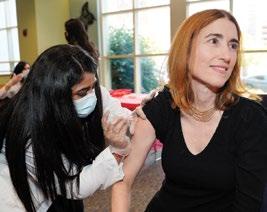
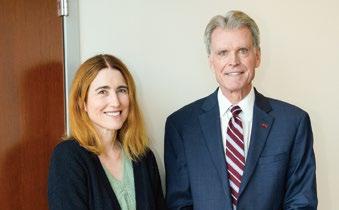
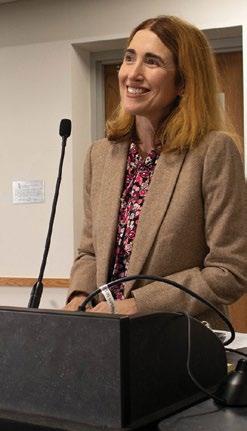
... with collaborations, events, even vaccinations
the Department of Practice, Sciences, and Health Outcomes Research, has known Michel throughout her time at the School, both as a student and now as a colleague. Tran is co-chair of the Curriculum Reimagination Taskforce. She says Michel’s goal for the new curriculum is to move the School into the top five pharmacy schools in the nation, as ranked by U.S. News & World Report.
“She’s provided valuable insights on how to foster students’ career pathways and how we could better integrate our PhD and MS programs,” says Tran. “Her vision is to not only equip student pharmacists to become the successful pharmacists of today but to also provide them with the tools to become the pharmacists of the future.”
The second and third areas of Michel’s vision are to grow both research and master’s programs. These are areas where Jarrell believes Michel will make a significant impact. “Sarah is very accomplished in the research world,” he notes. “The research profile and portfolio of the School is well funded, and there are a lot of very seasoned investigators there. I'd like to see that grow even more.”
Michel has experience in both fundamental and translational research and intends to continue with that work as it allows her to stay up-to-date with the most innovative developments in pharmacy. During her career she has seen the value of collaborations and fostered partnerships with agencies but also with other professional schools at UMB, such as the School of Dentistry.
“We're enjoying a very collaborative time. There’s a broad sense of community and an emphasis on providing collegial support and building partnerships,” says Mark Reynolds, DDS, PhD, MA, dean of the University of Maryland School of Dentistry.
Reynolds has had many opportunities to work with Michel, particularly when she was president of the UMB Faculty Senate. A highlight of her leadership tenure was that she actively participated in the passage of

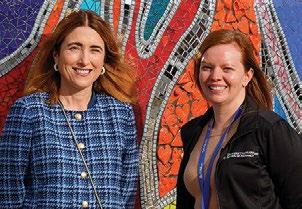
a Statement of Shared Governance for UMB. Reynolds describes Michel as a thoughtful, engaged leader who places a high value on advancing pharmaceutical sciences and clinical practice from the perspective of the School and beyond the campus.
“I think she is someone who has been able to balance, extraordinarily well, education and science,” he says. “She clearly places great value in understanding her community within the School of Pharmacy, at UMB, and broadly in the profession.”
Michel says one of her proudest achievements has been having students complete their PhD in her lab. Current PhD in PSC student Madison Worth is one such student as well as president of the Pharmacy Graduate Student Association. Worth explains that Michel is highly motivated and interested in pushing the limits of science. She envisions that the same critical thinking and problem-solving Michel brings to research will serve her well as dean. Importantly for emerging pharmaceutical researchers, Worth says Michel serves as a mentor for students.
“Dean Michel is known for being an advocate, with students knowing they have someone to turn to when in need of support,” she says. “She is a role model, as her resilience, devotion, and adaptability are recognized by all students.”
She is also an expert listener, Tran says. “She has held Schoolwide listening sessions and is meeting one-on-one with all the faculty,” Tran explains. “She is transparent and fosters collaboration so that all individuals feel involved in Schoolwide issues.”
Given her interest in shared governance, equity, diversity, and inclusion (EDI) are a major factor in Michel’s five-part vision. Her commitment to EDI was important to Lotanna Ezeofor, a third-year PharmD student who served on the dean search committee and is president of the School’s Student Government Association.
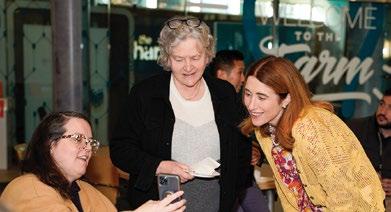

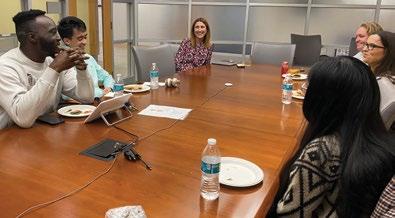

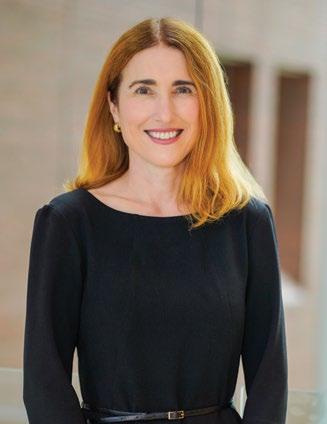
... and much interaction with faculty, staff, students, and alumni.
“Inclusivity is a key strength of hers,” says Ezeofor. “Dean Michel ensures that decisions are made with consideration for the varied experiences and backgrounds within the academic community. Her commitment to inclusivity creates a sense of belonging, making all members feel valued and heard.”
Ezeofor says Michel is well-respected by students who view her as an exceptionally intelligent individual with a wealth of knowledge. “Moreover, her teachings in the Biochemistry course within the PharmD program are widely acknowledged as some of the School's finest,” he adds.
Student well-being is important to Michel, who says that although the School is back to full in-person participation, post-COVID disconnectedness remains an issue. She is bringing back programs, like a yearly ice cream social, to re-engage students, faculty, and staff. “I want students to feel like UMB and our School buildings are their second home,” she says.
Ezeofor says he is impressed by Michel’s dedication to enhancing the relationship between students and the Dean’s Office. “As interim dean, she highlighted the importance of connecting with students, actively participating in student events, and making appearances during orientation for first-year students. Her commitment demonstrated that she truly wants students to feel supported.”
Today’s students are tomorrow’s alumni, and engagement with graduates is the fifth and final point of Michel’s vision. The School has more than 7,000 alumni, and Michel is eager to connect and learn from them. She’s already begun visits to alumni and welcomes them back to the School to share their career wisdom with current students through events like the Grad Gathering program she created.
Allen, the Board of Visitors chair, is looking forward to watching engagement with alumni continue to grow under Michel. “We all want to support where we trained, the University, the organization that helped us to be successful,” says Allen. “I think all alumni want to know what's going on and to feel connected, and she’s well-positioned to do that.”
Michel’s five-point vision aligns with the School’s commitment to Pharmapreneurship. Since launching the signature initiative in 2017, the School of Pharmacy has secured funding for and developed numerous academic, clinical, research, and community components under its umbrella.
“Through cutting-edge research initiatives and innovative clinical services, we create an exceptional environment that fosters and values Pharmapreneurship among faculty and students,” says Michel. “With flexibility and strategic thinking, we can push ourselves further, helping our students, faculty, and staff achieve their career aspirations and address our nation's health care challenges.”
Michel has a deep understanding of pharmacy from an academic, research, and industry perspective. She’s demonstrated her leadership capacity and is respected by students and colleagues. The sum of these parts equals an incredibly strong foundation. It will serve her well as the challenges facing academia are significant, from fluctuating enrollment to competition for grants and other resources.
“I feel the excitement, the energy, and the enthusiasm that she brings to the role, which is an extremely difficult one and one that has been challenging for schools of pharmacy to fill,” says Allen, the former CEO of the American Society of Health-System Pharmacists Foundation. “The fact that we have someone who cares deeply and has been a part of the success of the University of Maryland School of Pharmacy and wants that success to continue — that is exciting.”
Michel isn’t afraid of a challenge. “In research, it’s all problems that you have to solve,” she explains. “In this role, there are different problems that we will try to solve in a way that has a positive impact.”
Under Michel’s leadership, the School will not only reimagine what it means to be a student of pharmacy and to have a career in pharmacy, it will become even more of a leading voice speaking out for this exciting and ever-evolving profession.

In August 2023, the U.S. Food and Drug Administration (FDA) renewed funding for the University of Maryland Center of Excellence in Regulatory Science and Innovation (M-CERSI) with a five-year, $50 million cooperative agreement. The innovative FDA/M-CERSI collaboration supports regulatory research but also sponsors workshops, lectures, and seminars aimed at advancing and promoting regulatory science. The events offer networking opportunities for experts from academia, industrial consortia, FDA scientists, and the public.
M-CERSI is one of the nation’s five FDA-funded CERSI programs, and the oldest, established in 2011. It is a collaboration between the University of Maryland School of Pharmacy and the University of Maryland, College Park.
M-CERSI is co-led by James Polli, PhD, the Shangraw/Noxell Endowed Chair in Industrial Pharmacy and Pharmaceutics in the Department of Pharmaceutical Sciences (PSC) at the School of Pharmacy (SOP), and William Bentley, PhD, the Robert E. Fischell Distinguished Chair in Engineering and director of the Robert E. Fischell Institute for Biomedical Devices at the University of Maryland, College Park (UMCP).



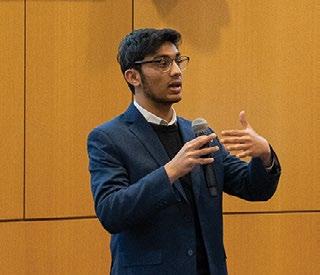


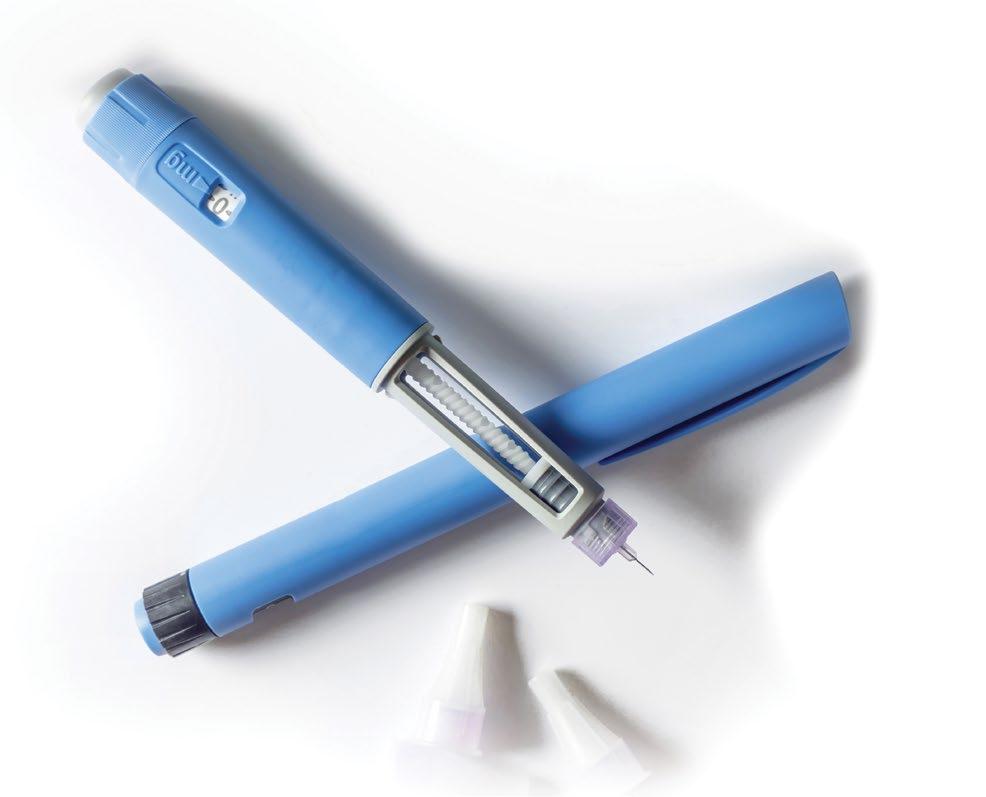
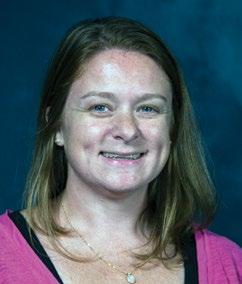
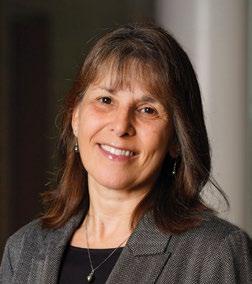
SCHOOL OF PHARMACY BECOMES A NATIONAL LEADER
BY GWEN FARISS NEWMANIn 2017, a young man in his 20s left a substance use disorder rehabilitation facility on the Eastern Shore of Maryland with a prescription for a long-acting injectable (LAI) medication. In other states, like Virginia, he could have walked into a local community pharmacy that day to have the injection administered at the pharmacy. But Maryland wasn’t yet authorizing pharmacists to administer LAIs and, while waiting for an appointment at a physician’s office for administration, the young man died.
“No pharmacist could administer it,” says Megan Ehret, PharmD, MS, BCPP, professor in the Department of Practice, Sciences, and Health Outcomes Research (P-SHOR) at the University of Maryland School of Pharmacy (UMSOP) and co-director of its Mental Health Program.
“I recall his mother saying, ‘It’s just so disheartening to think that my son died because no one could administer the medication when he needed it.’”
Megan Ehret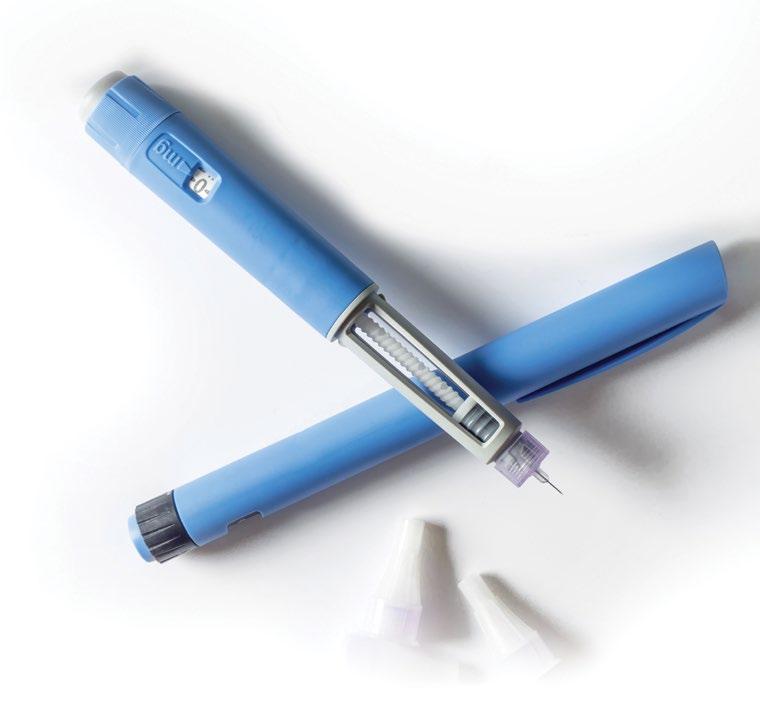
medications or suffer from some of the most severe maladies as well as repercussions from missed doses.
Along with the COVID-19 pandemic came a new sense of urgency both for vaccine availability as well as for traditional health care within the physician’s office setting. Having pharmacists authorized to administer the COVID-19 vaccine was an important public health initiative that was welcomed by both physicians and the nursing community as well as by patients themselves. But receptivity to pharmacists administering LAIs wasn’t always the case. Initially there was resistance from physicians and the nursing community.
“ We weren’t asking to take on the roles of physicians who prescribe these medications or nurses who administer them,” says Ehret, “but rather to serve as an added resource in a collaborative health care environment.”
Legislation for pharmacists in Maryland to administer LAIs was approved by the Maryland General Assembly in 2021 after long-term advocacy by UMSOP faculty members to state policymakers on the need
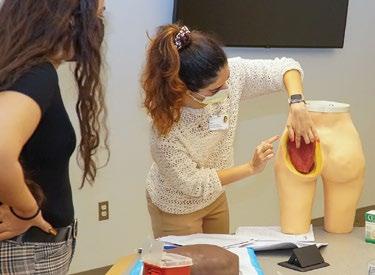
for expanded pharmacist authority. Regulations were developed and
Ever on the forefront, the School of Pharmacy in October 2022 promptly introduced into its Doctor of Pharmacy curriculum a course for third-year students to train them on administering LAIs.
The course — the first in the state and one of the few in the country — includes a self-paced study session, a medication mixing station, and a hands-on practice lab.
UMSOP students are now taught state regulations on administering maintenance injectable medications; how to prepare the medication, including proper reconstitution, shaking and drawing up medications into syringes; gluteal injections using a simulation anatomic model; and reviewing faculty-developed case studies that allow them to role-play patient
With this curriculum, every one of our student pharmacists graduates with the ability to both prepare the medications properly and to administer them, too,” says Bethany DiPaula, PharmD ’95, BCPP, FASHP, a professor of P-SHOR and co-director of the School’s Mental Health Program along with Ehret.
The first cohort of approximately 100 trained students graduates in May.
In quick succession, a second program developed by the School of Pharmacy allows already licensed pharmacists to be certified in delivering long-acting injectables. That program consists of a home study component and a hands-on learning lab to practice reconstitution and administration. Thus far, the program has been delivered to pharmacists in Maryland at UMSOP, at the Maryland Pharmacists Association’s Annual Meeting, and at an independent pharmacy in Annapolis, all in 2023.
The objectives of the maintenance injectable medication training are to provide appropriate education to the patient regarding the injectable medication, demonstrate the preparation of the medication for injection using appropriate sterile technique and infection control procedures,
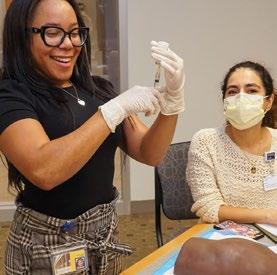
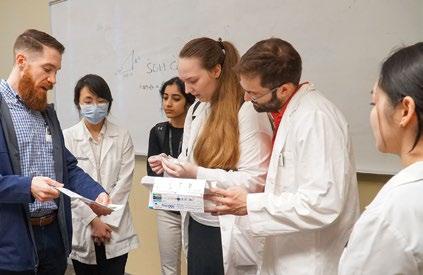
and, in accordance with the product labeling, select the appropriate administration site on an anatomical model.
Other objectives include demonstrate the injection in accordance with current practice standards, document the patient information, medication, lot number, dose administered, injection site, and patient reaction, and describe methods for communicating appropriate information to the prescriber.
The School of Pharmacy’s program has been so well received that organizations such as the American Psychiatric Association, the American Association of Psychiatric Pharmacists, and the Psych Congress Nurse Practitioner Institute have requested training at their conferences and events in cities like Boston, San Diego, and New York.
“Some are organizations we’ve previously worked with,” says Ehret. “They asked, ‘You have all this equipment already … would you be willing to bring it and teach us?’”
The stars of the training?
Anatomical models of human arms and buttocks — 36 of them, in fact, that trainees use to practice the injections. “Participants walk away more confident that they understand how to do this,” says DiPaula.
UMSOP was the first school of pharmacy in Maryland to offer LAI training for students and pharmacists. The training is unique nationwide because of the hands-on components with the anatomical models. The journal Mental Health Clinician recently published an article spotlighting the success of UMSOP’s program and its evolution over a short period of time.
In its first year, close to 1,000 students, pharmacists, and other health care providers at events throughout the state and nation have participated in UMSOP’s training program for the proper administration of LAIs.
“The largest percentage of long-acting injectables are medications for mental health illness and addictions,” says DiPaula, “and for patient populations like these who are vulnerable and already have access to care issues, this is a potential solution.”
“Each state has its own nuances, and I think Maryland has addressed
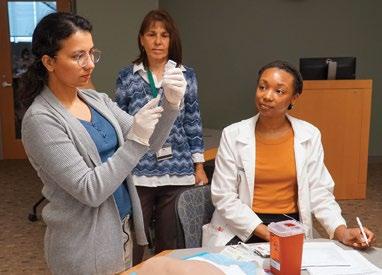
some patient populations that are very vulnerable and that really benefit from improved access to care,” says Ehret.
“There’s always a need for access especially in the Baltimore metro region,” she adds. “We have a manpower issue in health care nationwide, and it’s our goal locally to expand access to effective treatment — and to meet patients where they are.”
What are the early results of LAIs targeting vulnerable populations?
A study spotlighted in Medscape found that the suicide rate among patients with schizophrenia spectrum disorders was more than 20 times higher than that of the general population.
Several published studies show that only 40 to 60 percent of people with schizophrenia stay on track with their daily meds and that switching to a long-acting injectable antipsychotic within the first two years of a daily oral pill protocol reduced the risk for death by suicide by 47 percent.
A study from the University of California, Los Angeles showed that of patients recently diagnosed and prescribed medication, just 5 percent of those using LAIs saw a return of their symptoms, versus 33 percent taking daily oral medications.
“There is definite data demonstrating safety and effectiveness,” says DiPaula.
Ehret laments the death of the young man whose loss prompted changes in Maryland’s stance on pharmacists administering LAIs.
“Had he been able to walk into a community pharmacy in Maryland, a pharmacist could have administered an injection that might have saved his life.”
DiPaula and Ehret both specialize in psychiatric pharmacology “so this initiative is near and dear,” says DiPaula. “To design and implement a program like this is a significant milestone.
“The health care field is changing, and the role pharmacists play is as well,” she adds. “Patient care needs are changing, too. So, it makes sense that delivery options will also change. It’s exciting.”
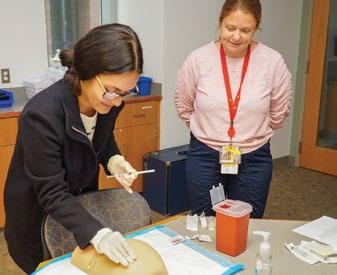
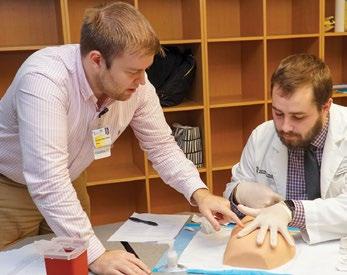
Ranked No. 1 in Maryland and No. 14 in the nation by U.S. News & World Report
Located near the fourth largest biotechnology hub in the United States.
10 academic programs: the PharmD, three PhDs, six MS programs, plus seven graduate certificates.
Ranked No. 9 in funded research grants by the American Association of Colleges of Pharmacy.
$38.5 million in grants and contracts in 2022 — National Institutes of Health (NIH), National Science Foundation, Food and Drug Administration, Agency for Healthcare Research and Quality, PhRMA Foundation, and the pharmaceutical industry.
Exclusive home of Pharmapreneurship®, the School of Pharmacy’s commitment to supporting and best positioning both faculty and students to achieve their career aspirations and address our nation’s health care challenges.
12 centers, five programs, and three facilities provide public education, conduct research, and link clinical and academic activities to strengthen the health infrastructure across the state of Maryland.
1,000 students enrolled in our PharmD, PhD, MS, and graduate certificate programs.
Pharmapreneurship Pathway in the PharmD curriculum for pharmacy students to pursue special interests in innovation, entrepreneurism, and creativity.
$30,000 Gyi Memorial Scholarship for Pharmapreneurship — a full year of tuition for a pharmacy student who has demonstrated a commitment to pharmapreneurship. Largest scholarship in School history.
$1.1 million NIH grant for Initiative for Maximizing Student Development to increase the number of students from under-represented groups in the School of Pharmacy’s PhD in Pharmaceutical Sciences program and the School of Medicine’s Graduate Program in Life Sciences program.
More than 7,000 alumni who are founders of companies, leading practitioners, researchers, policymakers, and advocates.
Nine $10,000 Wagner Scholarships awarded to students in the Pharmapreneurship Pathway, providing a platform to explore business ideas and ventures.
A diverse student body with more than 31 non-English languages spoken and citizens of 33 different countries.
Ranked No. 6 by Industry Pharmacists Organization for students pursuing pharmacy industry fellowships, with 26 of our PharmD grads in the 2022-23 cohort.
4.7/1 PharmD student to faculty ratio.
Ranked by the American Society of HealthSystem Pharmacists in the top 20 percent of all pharmacy schools for number of postgraduate year 1 (PGY1) residencies matched, with 43 PGY1 matches from the Class of 2022.
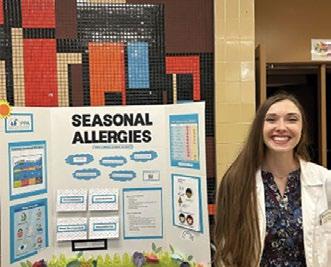
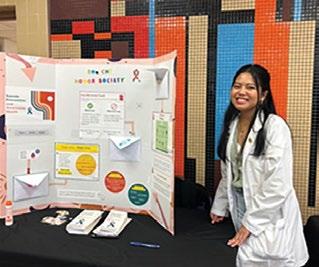
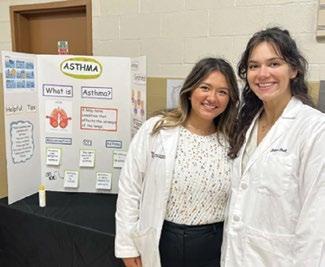
Several Student Government Association organizations attended the Furman L. Templeton Preparatory Academy Fall Health Fair on Sept. 28. Emma Nelson, Class of 2025 and a member of the Pediatric Pharmacy Association, educated parents and students about seasonal allergies and how to treat them. Rho Chi member Leila Dabalos, Class of 2025, shared information on smoking cessation and suicide awareness and prevention. Samantha Staszewski, Class of 2025, and Jillian Doll, Class of 2026, both members of the American College of Clinical Pharmacy, led an activity to demonstrate what it feels like to breathe with asthma.
Rho Chi, the School of Pharmacy’s academic honor society, launched a new initiative aimed at establishing and maintaining partnerships by donating school supplies to students in need. By fostering collaborative efforts, Rho Chi hopes to create a sustainable platform for supporting education and a sense of community engagement that will benefit the West Baltimore community for years to come. On Sept. 18, Rho Chi members Ysabelle Calara and Sydnei Riddick, both of the Class of 2025, delivered the school supplies to New Song Community Learning Center, ConneXions Arts School, and the Ruth M. Kirk Recreation and Learning Center.
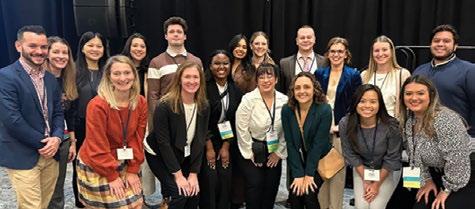
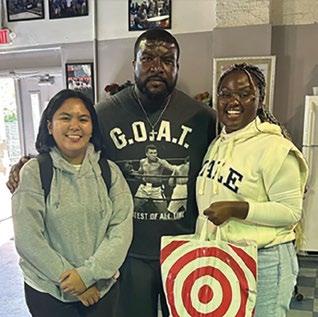
Members of the American College of Clinical Pharmacy (ACCP) attended ACCP’s 2023 annual meeting on Nov. 11-14 in Dallas, Texas, where some had the opportunity to present their own research.
The Student Society of Health System Pharmacists hosted a roundtable event on Nov. 9 in Pharmacy Hall for students to meet pharmacists who work in a variety of health systems. Students met six pharmacists who described their job and their career path. Shown from left are Diana Fatoohi, Class of 2027, Kristen Fink, PharmD, and Trish Cao, Class of 2027.
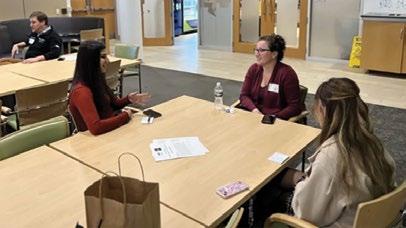
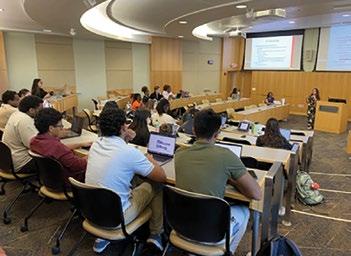
Members of the Academy of Managed Care Pharmacy and the Industry Pharmacists Organization kicked off the fall semester on Oct. 3, with an insightful CV workshop hosted by Kristine Parbuoni, PharmD ’05, BCPPS, associate professor in the Department of Practice, Sciences, and Health Outcomes Research. The event gave students the foundation to create a powerful CV for their post-graduation job search.
Phi Lambda Sigma and Rho Chi members hosted a FaculTea on Oct. 23, complete with pastries, coffee, and tea. It was an informal, yet structured gathering where faculty and students got to know one another on a personal level. “Thank you for being awesome” pens were distributed to faculty who participated.
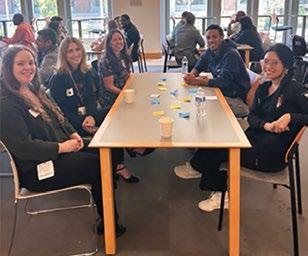
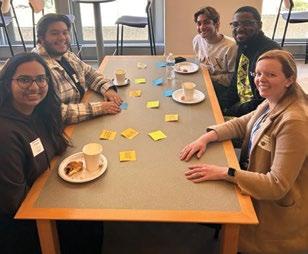
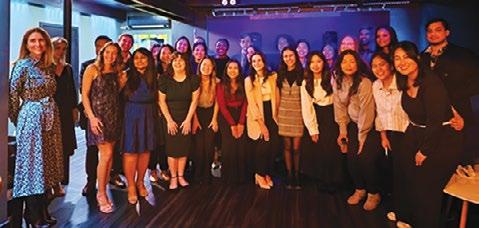
On Nov. 28, Rho Chi — the School’s academic honor society — hosted its annual dinner to recognize and celebrate the academic excellence of PharmD students.

Sheneil Black, a graduate student in the Department of Pharmaceutical Sciences (PSC), received a Genentech-Meyerhoff Graduate Fellowship.
Nicholas Caprio and Joanna Shaju, both fourth-year student pharmacists, have been chosen for AstraZeneca-University of Maryland Early Clinical Development Fellowships.
Athanasios Chamzas and Brooke Langevin, students in the MS in Pharmacometrics program, received 2023 Student Abstract Awards from the American College of Clinical Pharmacology.
Andrea Cottingham, Aarion Romany, Andrew Stoltzfus, and Christina Williams, graduate students in PSC, received the department’s Graduate Merit Awards.
Academy of Managed Care Pharmacy (AMCP) members attended the AMCP annual meeting — called Nexus — on Oct. 14 in Orlando, Fla., where students networked and explored educational opportunities.
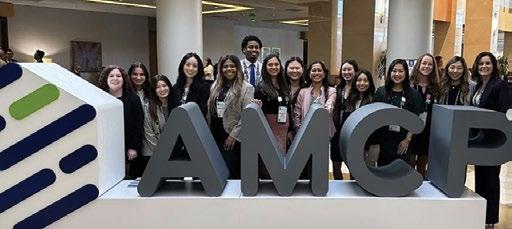
On Oct. 12, students worked in teams of two to create a patient care plan as part of the annual American Society of Health-System Pharmacists (ASHP) Clinical Skills Competition. The teams participated in an oral and written round, with winners receiving free registration to ASHP’s midyear meeting and a chance to compete at the national level. The winners of the 2023 Clinical Skills Competition were Jennifer Lee and Jonah Ho, both of the Class of 2024.
Aziza Frank, a graduate student in PSC, received a Genentech-Meyerhoff Graduate Fellowship and received the Victor E. and Dorothy M. McIntosh Award from the University of Maryland, Baltimore County’s Meyerhoff Graduate Fellows Program.
Samuel Krug, a graduate student in PSC, received the Conference MVP Award for his role as conference programming chair for the 13th Annual oSTEM conference held in Anaheim, Calif., in November 2023.
Nathaniel McClean, Khady Ouattara, and Aarion Romany, graduate students in PSC, received Fall 2023 Dean’s Teaching Fellow Awards.
Roshni Patel, a graduate student in PSC, received the Top Poster Award at the Controlled Release Society’s annual meeting in Las Vegas.
Jannat Saini, a student in the PhD in Pharmaceutical Health Services Research (PHSR) program, has received a oneyear, $38,012 grant from the Agency for Healthcare Research and Quality for “Towards a Better Understanding of Access Factors Associated with Treatment and Outcomes Among Medicaid Enrollees with Opioid Use Disorder and Depression.”
Sarah Tanveer, MS, a graduate student in PHSR, received a one-year, $27,000 grant from Oak Ridge Institute for Science and Education for “Research Participation Program at the U.S. Food and Drug Administration.”
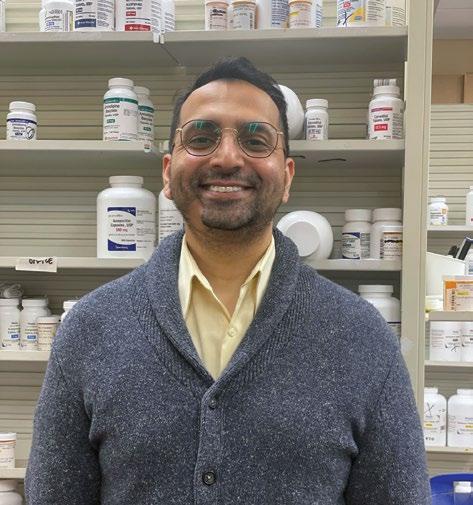
As one of his many duties at Mt. Vernon Pharmacy at Fallsway in Baltimore, Shivas V Patel, PharmD ’15, serves as a preceptor to students at the University of Maryland School of Pharmacy (UMSOP).
His objective is to offer students an experience where they are heard, respected, and trained.
He encourages them to build confidence and their professional knowledge and become effective leaders in a pharmacy team. The students should have a chance to make mistakes and learn from them, to have full access to preceptors and develop that relationship, thus becoming more competent, says Patel.
“I have the satisfaction of seeing myself as a teacher because I do teach students, that’s what a preceptor does. Another benefit of being a preceptor is the chance to meet students of diverse backgrounds from around the world,” he says.
A perfect example is Laith Alrufaye. As a first-year UMSOP student in May 2022, Alrufaye already had worked as a pharmacist in his native Iraq and in the United Arab Emirates, as well as a pharmacy technician at a community pharmacy in Alabama.
Yet he still had much to learn in his Introductory Pharmacy Practice Experience rotation under Patel.
Alrufaye, now a third-year student, was impressed by the pharmacy team’s frequent communication with and commitment to its underserved patient population. Patel taught him the importance of medication management, and Alrufaye observed the pharmacy’s staff monitoring the progress of their patients and maintaining contact with them.
“This was a short, one-week rotation, but it made an impact,” Alrufaye says. “I learned how to communicate with various
populations and was inspired to consider working in community pharmacy.”
Since 2018, Patel has precepted 35 UMSOP students, both Introductory (one-week) and Advanced (five-week) Pharmacy Practice Experience rotations in the community setting. Providing more than 30 percent of the School of Pharmacy curriculum, preceptors are crucial to the students’ professional development.
“Because a majority of graduates will practice in a community pharmacy setting, an initial experience that is hands-on and collaborative, like Dr. Patel’s, is critical in building knowledge, skills, and confidence for future practice,” explains Agnes Ann Feemster, PharmD, BCPS, associate dean for academic affairs at the School and associate professor in the Department of Practice, Sciences, and Health Outcomes Research.
“Dr. Patel provides students with the opportunity to experience community pharmacy practice through the eyes of an independent practitioner. Our students comment that his knowledge of community practice is second to none and that they benefit immensely from his mentorship,” she says.
Now the manager at the Mt. Vernon Pharmacy at Fallsway, Patel is grateful to his employer, Stephen Wienner, BSP ’91, who has reinforced his desire to be a preceptor.
And while he is proud to have received a 2020 UMSOP Preceptor of the Year Award, Patel feels privileged to have been asked “to hood” five School of Pharmacy students at their May 2023 graduation.
“It’s very meaningful to me to see them cross that stage and become a pharmacist, a colleague actually,” he says.
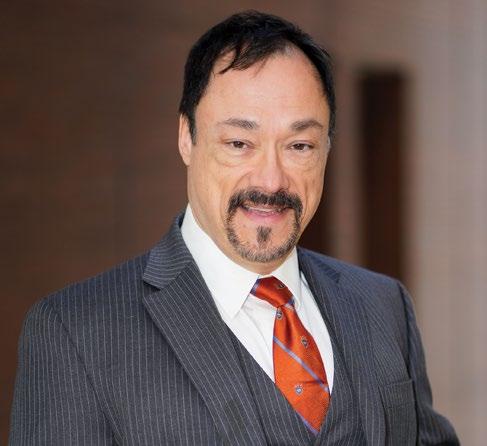
When Robert Karrs, MBA, isn’t leading the four-person team responsible for overseeing the University of Maryland School of Pharmacy’s $93 million operating budget, he’s probably riding his bicycle. An active cyclist, Karrs estimates he’s ridden more than 100,000 miles. You won’t catch him biking to work though. “I’m too lazy for that,” Karrs jokes.
In his role as director of finance, a position he’s held since 2018, Karrs works closely with senior leadership to provide input on the strategic direction of the School, which includes managing the $35 million in state appropriations and tuition and fees.
Since his tenure began, Karrs has overseen a reorganization that resulted in an expansion of the Office of Finance and assisted in the implementation of a new campuswide financial system, a new employee reimbursement and travel system, and a forthcoming human resources system.
Karrs is known at the School for being very friendly and downto-earth, according to his supervisor William Cooper, MBA, senior associate dean for administration and finance. “Robert is a problem solver and tries to be creative while still keeping us compliant,”
Cooper says. “His steady hand, along with the talented finance team, keeps the School on track with the optimal management of our funds, including our endowment.”
Karrs came to Baltimore in 2011 for a position with the University of Maryland School of Medicine’s Institute of Human Virology after stints at Duke University Medical Center and Yale School of Medicine.
After 30 years in academia, Karrs really appreciates the School of Pharmacy’s congenial environment. “There’s an understanding that the research, patient care, and education that we do comes first,” he says. “Everybody’s here for the same thing.”
His career in academia began at the Louisiana State University Health Sciences Center New Orleans (LSUHSC), after earning dual master’s degrees in business administration and Latin American studies from Tulane University. Karrs applied his graduate experiences to his first job at LSUHSC, where he served as the local coordinator for the university’s research center in San Jose, Costa Rica. In 2005, he was rated as one of the top business managers in the LSUHSC School of Medicine.
Karrs left New Orleans after Hurricane Katrina flooded the LSUHSC campus in 2005. But he stayed in academic medicine. While he acknowledges that his career trajectory was mostly practical — “Once you develop certain skills and talents, the next job often leads to a similar job that uses those same skills and talents,” he says — Karrs has felt connected to the mission of his workplaces.
He watched his friends accept finance positions in the private sector, but “I was happy handling money for people who were trying to cure disease and save lives, or make people’s lives better,” Karrs says. “In academia, there’s that sense that what you’re doing is important because of the end result.”
Before settling in Maryland, Karrs took a self-designed sabbatical in May 2010 and moved to Montreal, Canada, something he’d always wanted to do. He filled his days with museums and cycling trips, including on the Parc Linéaire Le P'tit Train du Nord, a recreational trail that spans 200 kilometers, or 124 miles, through the Laurentian Mountains in Quebec.
An avid traveler, his next excursion is to witness the total solar eclipse in Cape Girardeau, Mo., this spring. “I missed the last one,” Karrs says. “I went up to the roof of Pharmacy Hall with then-Dean Eddington, but if you’re not in the zone of totality you really don’t see anything. So, this time I’m not going to miss it.”
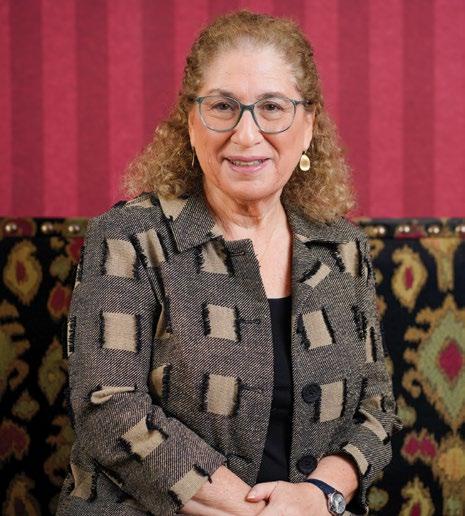
Jill Molofsky, BSP ’81, knows a little something about Pharmapreneurship®, the term trademarked by the University of Maryland School of Pharmacy that represents the intersection of pharmacy science, research and practice, with entrepreneurship.
Along with fellow alumni Ellen Yankellow, BSP ’73, PharmD ’96, and now deceased James Tristani, BSP ’73, Molofsky helped build Correct Rx Pharmacy Services into a leader in its field, serving more than 200,000 patients annually at public and private jails, correctional centers, and prisons across the country. According to Molofsky, vice president of Correct Rx as well as a co-founder, one of the best parts of the company’s success is that it allows her to give back.
“We take pride in providing mentorship and helping people build their careers — especially women,” she says. “That’s what keeps you going, the employment you create and being at a point when you finally have the resources to give back and help others.”
Not surprisingly, Molofsky’s philanthropy at the School has centered on women and entrepreneurship. She serves on the advisory board of the School’s Center for Women in Pharmapreneurship and, recently, provided funding to support a marketing campaign that will promote the pharmapreneurship initiative to a national audience. Her goal is to ensure support for emerging entrepreneurs that was not readily available when she and her colleagues built Correct Rx.
“You want people to have the confidence that they can do this, to know they have someone to lean on and the support of other women in the profession,” she says. “You don’t want people thinking ‘But what if I fail?’ What you need is to think ‘What if I succeed?’ So in that way, my goals align with pharmapreneurship and that of the center.”
Molofsky’s support is very apt as no one understands the
challenges and opportunities that exist for entrepreneurs, particularly women, more than she. Magaly Rodriguez de Bittner, PharmD ’83, FAPhA, FNAP, the School’s Felix Gyi Endowed Memorial Professor in Pharmapreneurship, explains that Molofsky’s philanthropy supports programs and training that directly empower students. “The Center for Women in Pharmapreneurship in particular can really inspire women to take ownership of their lives and careers,” says Rodriguez de Bittner.
Rodriguez de Bittner says philanthropy from alumnae like Molofsky allows the School to explore visionary programs that may not fall within the strict structures of a grant or state funding. For example, Molofsky’s support of a marketing campaign will help spread the message that the School is a leader in pharmapreneurship and an innovative force in the field of pharmacy and health care to new and larger audiences.
“Jill believes it is important for pharmacy to be innovative, for pharmacists and scientists to be able to take risks, and to demonstrate to health care providers and society the capabilities that pharmacists have,” says Rodriguez de Bittner.
Molofsky says this is an exciting time to be engaged with the School, especially as it continues to roll out innovative programs.
“The future of our profession is of the utmost importance, and we need pharmacists trained for the future, not the past,” she explains. “The University of Maryland School of Pharmacy has done a good job of thinking about where the profession needs to be. Everyone should be engaged to keep it going for the next generation.”
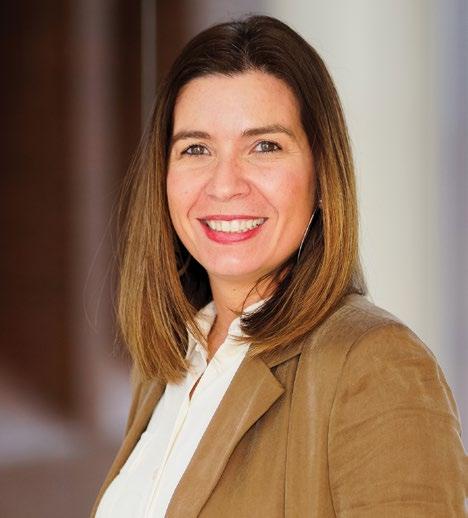
There are two things Ester Villalonga Olives, PhD, MSc, never expected would happen when she came to the United States from Menorca, Spain, 11 years ago as a fellow at the Harvard T.H. Chan School of Public Health at Harvard University.
One was to stay longer than a year.
The other was to receive a prestigious grant from the National Institutes of Health (NIH).
It was the cultural richness and diversity of this country, which, she says, is both fascinating and challenging, that captivated her attention, leading her to settle here and focus her research on the social determinants of health.
Now, with a $3 million NIH grant, Villalonga Olives, associate professor in the Department of Practice, Sciences, and Health Outcomes Research at the University of Maryland School of Pharmacy, is developing an innovative measurement tool that will help researchers better understand the social and structural factors that contribute to health inequities for Black and Hispanic people.
“Our proposed measure reflects the complex interplay of cultural, social, and environmental factors across levels — from individual to societal — that impact people’s lives and assert racist policies and beliefs,” she says.
Villalonga Olives’ Structural Racism Measure builds on current tools to better capture social disadvantage by taking what she calls an “intersectional” approach that includes data from many sources and sectors.
For example, Villalonga Olives plans to add important economic indicators to existing measures of discrimination from sectors such as housing, education, and employment to her model. The wealth
gap, she explains, is directly related to structural racism and impacts people’s health.
“We saw this during the pandemic,” she says. “I looked at the economic practices of people struggling to keep their businesses open and found that the federal government’s loan program was going to mostly White owners.”
Perhaps the most transformational aspect of the Structural Racism Measure is that it will be expanded to Hispanics, a population Villalonga Olives believes has been left behind for too long in studies looking at race and its relationship to health inequities.
“Many of the measures that already exist were not developed for and tested with Hispanics,” she says.
Leading a diverse and multidisciplinary team of social epidemiologists, behavioral scientists, and psychometricians from Yale, Duke, Johns Hopkins, and other universities, Villalonga Olives will compile a series of indicators from existing indexes that assess discrimination at multiple levels across key sectors. The team will then work with an expert panel of researchers and community participants, including community business owners, to ensure the measures are culturally relevant for both Blacks and Hispanics and in both English and Spanish.
“We need to make sure that what we are asking is meaningful to both groups. It is about diversity, and it is about considering the voices of different people,” says Villalonga Olives.
Being able to work on a project she believes will have major impact alongside a diverse team of people she likes and admires is the “sweet spot” of her career, says Villalonga Olives, who came to the School of Pharmacy in May 2017.
She became interested in the immigrant experience when she immigrated to the United States and has since then become an advocate in the Hispanic community. She recently traveled to El Salvador to experience firsthand the hardships pushing so many people to leave Central America and settle in the Baltimore/ Washington area.
“Sometimes I just feel like I have to intervene,” she says.
By creating a tool that is free of bias and works for Black and Hispanic people, Villalonga Olives hopes her study will open new horizons for decision makers, clinical practitioners, and researchers to reduce racial health inequities.
“We cannot change things if we can’t measure them well.”
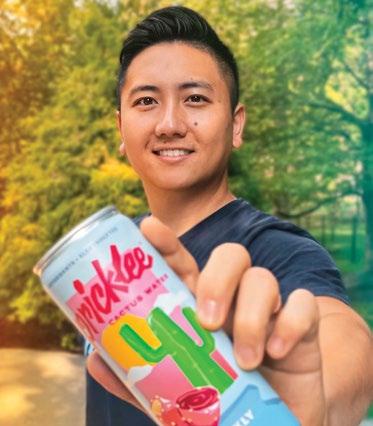
The passion Kun Yang, PharmD ’15, has for helping people led him first to the pharmacy profession, and then quite naturally to entrepreneurship in the health and wellness industry. As CEO and founder of Pricklee Cactus Water, Yang and his colleagues are carving out a sliver of the fast-growing hydration beverage market.
Founded in 2021, Pricklee is a beverage derived from the prickly pear cactus and is a powerhouse of antioxidants, electrolytes, and vitamin C that is naturally low in sugar. Some dub the popular product as the next coconut water.
According to Grand View Research, the global packaged cactus water market size is expected to reach $73.7 million by 2027.
“We’re really hitting our stride,” says Yang, who has launches planned in many new markets after first debuting the health and wellness drink in the American Southwest — Nevada, Arizona, Southern California, and soon Texas. Bright, colorful packaging and a fun, high-energy brand appeal to Millennials and Generation Z.
As a father of two and someone who describes himself as passionate about health and wellness, Yang is excited about offering consumers a delicious drink that is natural. “I grew up drinking soda, Gatorade, and Tang, and I want to see the next generation growing up with way better options,” says Yang.
His business partner, Mo Hassoun, grew up in Lebanon, where his family would enjoy cactus water in the hot summer heat.
Yang and Hassoun, who is also a pharmacist, met in Boston as postdoctoral students. The idea for Pricklee sprouted when Hassoun shared his family recipe. “One sip, and we knew we had something special,” says Yang.
Born in China and raised in Canada, Yang moved to the United States after attending McGill University. When he was ready to apply to pharmacy school, he says, the University of Maryland School of Pharmacy (UMSOP) appealed strongly to him.

“UMSOP breathed life into my entrepreneurial spirit through research, networking, and leadership opportunities that were afforded to me via its interdisciplinary network, professional schools, and communities,” Yang says. “Looking back, my time there showed me that I wasn't solely defined by the letters after my name, and that I could make a greater impact in my career when thinking outside the box and collaborating with people and communities from different walks of life.
“This ecosystem is truly rare and diverse in thought, and I encourage all students to take full advantage of the resources and connections that UMSOP offers beyond the four walls of Pharmacy Hall,” he says.
When he and Hassoun decided to go into business together, they found the transition relatively easy.
“Our pharmacy training laid the foundation of entrepreneurship by providing us with an incredible network and skill set,” says Yang. They were able to present Pricklee on ABC’s “Shark Tank” in 2021 and received multiple competing offers from the Sharks. “We went in with the goal of getting great PR and great advice, and we got both,” Yang says.
“Entrepreneurship isn’t for everyone, but if there’s one lesson that we can extrapolate from our experience, it’s that you should always challenge yourself to set the biggest goals possible — because regardless of the outcome, the growth and self-awareness you will gain is the greatest reward in life you can achieve. They say the journey is the destination, and boy, were they right!”
Pricklee continues to build off its strong momentum in the Southwest and plans on launching into Whole Foods this year. “We take extreme pride in being the thought leaders and disruptors of this exciting category, and we’re honored and excited to continue our mission of helping people live healthier and happier lives, naturally.”
The University of Maryland School of Pharmacy Alumni Association honored its recent award recipients at a special event on Nov. 4. The 2020-2021 and 2021-2022 recipients of the Evander Frank Kelly Honored Alumnus Award and the 20192020, 2020-2021, and 2021-2022 recipients of the B. Olive Cole Honorary Alumnus Award were recognized, marking the first time since before the COVID-19 pandemic that the Alumni Association held an event.
“I congratulate each of our award winners and thank the Alumni Association for its hard work and dedication to helping advance the School of Pharmacy,” said Sarah L.J. Michel, PhD, dean and professor of the School during remarks at the event. “Tonight is about coming together to recognize honorees who were nominated and selected for these awards by their colleagues, classmates, and friends. As your dean, I am incredibly fortunate to be a part of such a strong and impactful community of alumni — truly a pillar of strength at the School.”
The Evander Frank Kelly Honored Alumnus Award recognizes School of Pharmacy alumni who have demonstrated outstanding accomplishments in the profession of pharmacy through service in local, state, and national pharmacy, government, or civic organizations, and are active in the promotion of pharmacy at the University of Maryland.
• 2021-2022: Hoai-An Truong, PharmD ’05, MPH, FAPhA, FNAP, professor and director of public health, School of Pharmacy and Health Professions, University of Maryland, Eastern Shore
• 2020-2021: Sadhna Khatri, PharmD ’00, MS, MPH, MEd, commander, U.S. Public Health Service Commissioned Corps, program coordinator, Office of Compliance and Biologics Quality, Center for Biologics Evaluation and Research, U.S. Food and Drug Administration
The B. Olive Cole Honorary Alumnus Award is presented to a non-alumnus who has demonstrated continued interest and exceptional loyalty and service to the profession of pharmacy in Maryland, and whose professional, personal, civic, and philanthropic pursuits reflect the high standards and values associated with the School of Pharmacy and its Alumni Association.
• 2021-2022: Emily Heil, PharmD, MS, BCIDP, BCPS-AQ ID, AAHIVP, professor in the Department of Practice, Sciences, and Health Outcomes Research (P-SHOR)
• 2020-2021: Kathryn Walker, PharmD, BCPS, FAAHPM, associate professor of P-SHOR
• 2019-2020: Charmaine Rochester-Eyeguokan, PharmD, CDCES, BCACP, professor of P-SHOR
“Our alumni community of more than 7,000 individuals represents diverse degree programs and careers,” said Catherine Cooke, PharmD, MS ’18, BCPS, PAHM, research associate professor of P-SHOR and president of the Alumni Association. “It was an honor to celebrate our award winners of the past few years and thank them for their impact on the pharmacy profession and the support they give to our community.”
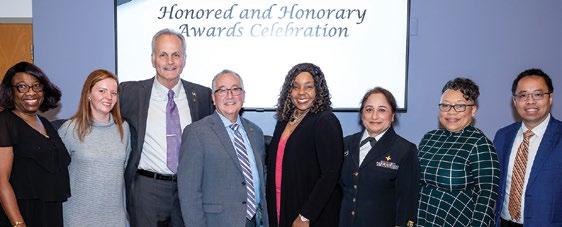
From left, Charmaine Rochester-Eyeguokan, PharmD, CDCES, BCACP; Emily Heil, PharmD, MS, BCIDP, BCPS-AQ ID, AAHIVP; James Bresette, PharmD ’97; Matthew Shimoda, PharmD ’84; Lynette Bradley-Baker, BSP ’92, PhD ’99; Sadhna Khatri, PharmD ’00, MS, MPH, MEd; Gina McKnight-Smith, PharmD ’97, MS ’23; and Hoai-An Truong, PharmD ’05, MPH, FAPhA, FNAP.
Catherine E. Cooke, MS ’18 President
Sadhna Khatri, PharmD ’00 President-elect
Jennifer Miller-Wolf, PharmD ’20 Past president
Thomas Adriaens, MS ’20 Secretary
Members at Large
James Bresette, PharmD ’97
Carla Cobbs, PharmD ’12
Amy Kruger Howard, PharmD ’17, MS ’21
Niyati Shelat, MS ’22
Hoai-An Truong, PharmD ’05
The University of Maryland School of Pharmacy (UMSOP) welcomed back alumni from four graduate programs on Oct. 13 for the fourth Grad Gathering, which served as a homecoming to reconnect alumni, postdocs, students, faculty, and staff.
The biennial event, which began a decade ago, included members of four graduate programs: PhD in Pharmaceutical Sciences (PSC), MS in PSC, Pharmaceutical Health Services Research (PHSR), and MS in Regulatory Science.
“Our previous events were great successes — our alumni came home to the School of Pharmacy, where they reconnected with lab mates and mentors, and our students got to hear about the career destinations, opportunities, and experiences of our alumni,” said Sarah L.J. Michel, PhD, dean and professor of the School in her remarks at the event. “I am excited to welcome members of multiple programs and thank you for taking time out of your busy schedules to be with us today.”
The Grad Gathering featured career panel discussions, a research poster session, a happy hour, and numerous other networking opportunities.
Two keynote speakers included Marishka Brown, PhD ’09 (PSC), who is director of the National Center on Sleep Disorders Research at the National Institutes of Health, as well as Alexander Gaffney, MS ’20 (Regulatory Science), RAC, who is executive

director of regulatory policy and intelligence at POLITICO, AgencyIQ.
“We are fortunate to have many alumni of our programs who are leaders in their fields and excited to give back to the next generation of UMSOP students,” said Nina Roa, MPA, associate director of career development and placement in the Office of Graduate Programs, who organized the event. “We have seen so many new and existing connections flourishing today and hope to continue growing this event to keep in touch with our alumni.”
Several alumni who attended the Grad Gathering mentioned wanting to give back to the UMSOP community and help students navigate their early careers.
“I received a great opportunity at UMSOP and now I’m trying to help current students find the right path for their development,” said Juan-David Rueda, PhD ’19 (PHSR), who is now global value strategies director at AstraZeneca.
Others mentioned wanting to share the varied career options open to graduates from the School in both traditional and nontraditional industries.
“It’s really important for me to inspire others to get into clinical research,” said Jessica Rowe, MS ’16 (Regulatory Science). “Students aren’t aware it’s a career option for them, so I want to share my experience and the different opportunities available to them.”


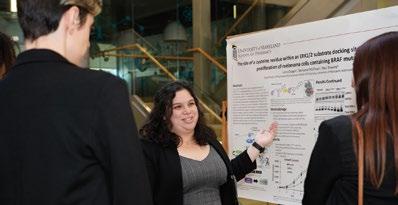
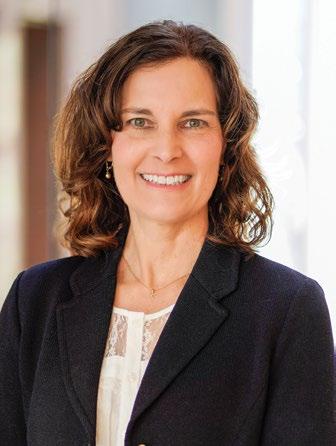
This issue we bring you a Q&A with Alumni Association President Catherine E. Cooke, PharmD, MS ’18, BCPS, PAHM, who earned her MS in Pharmaceutical Health Services Research (PHSR). Cooke is a research associate professor in the Department of Practice, Sciences, and Health Outcomes Research at the School of Pharmacy.
How long have you been in Maryland?
I’ve lived in Maryland for more than 20 years, first in Federal Hill in Baltimore City, then Perry Hall in Baltimore County, and now in Ellicott City in Howard County. I love downtown Baltimore, and this year my family and I spent New Year’s Eve at the Inner Harbor. We saw an amazing drone show. Who could have envisioned so many flying aircraft forming a huge Maryland crab or a Baltimore Raven? It was spectacular!
What brought you to Maryland?
I’ve lived in a few different states: Florida, New York, Iowa, Oklahoma, South Carolina, Pennsylvania, and Delaware, so it’s a natural question as to how I came to Maryland.
As I was finishing up a combined ambulatory care/ managed care pharmacy residency, I was searching for a faculty position. When I interviewed at the University of Maryland School of Pharmacy, they were excited to integrate populationbased pharmacy care into the curriculum. They wanted students to learn about managed care pharmacy and to enhance their skills in assessing the value of a medication for a population of patients (e.g., determining formulary placement for a new medication). It was a perfect fit for me.
How did you become an alumna of the University of Maryland School of Pharmacy?
My initial training and early experience focused on serving as a clinician. I spent many years caring for patients in an outpatient medical group practice in Baltimore. I realized that patients faced challenges that couldn’t be solved in the office. Policy
changes were needed to help with access to quality pharmacy care, and research was needed to bring about policy changes. I decided to go back to school to, as the PHSR program puts it, become “skilled in the evaluation of pharmaceutical services and interventions.” I earned a master’s degree in PHSR in 2018.
What has the Alumni Association been up to this year?
Thanks to a committed Alumni Association Council — Sadhna, Tom, Jim, Carla, Amy, and Hoai-An — we’ve been working on reconnecting with alumni. We’ve held some alumni events and are planning more. We’re also excited to be involving the alumni in reimagining the new PharmD curriculum, interviewing PharmD applicants, and choosing the association’s student and alumni award winners. This is also a special year as we have a new dean at the School of Pharmacy, Dr. Sarah L.J. Michel.
What has been your favorite part of being president of the Alumni Association so far?
Catching up with former students, residents, classmates, and faculty. It’s been fun to reminisce, Did I really say “BINGO” every time you got the answer right? And, to hear what everyone has been up to (new jobs, expanding families, and fun). I hope that if you’re reading this and we haven’t connected in a while, that you’ll reach out and say hello.
My email is ccooke@rx.umaryland.edu
1991
George Garmer, BSP, received the 2023 Champion of Champions Committed to More Joyful Lives Award for Walgreens Region 6.
1992
Lynette Bradley-Baker, BSP, PhD ’99, received the Certified Association Executive designation from ASAE: The Center for Association Leadership.
1993
Shelby Reed, BSP, PhD ’99, received the 2023 Marilyn Dix Smith Leadership Award from ISPOR, the Professional Society for Health Economics and Outcomes Research.
Tecoya Farrakhan, PharmD, MS ’21, started a new position as principal consultant at S&S Advisors.
Tali Johnson, PharmD, started a new position as chief of the Pharmaceutical Management Branch at the National Cancer Institute.
Simu Thomas, PhD, has been appointed vice president, global head, Health Economics and Outcomes Research, Medical Communication, and Training at Alexion Pharmaceuticals, Inc.
Hoai-An Truong, PharmD, earned the International Olympic Committee Drugs in Sport certificate.
Amol Joshi, PharmD, started a new position as associate director, medical science liaison – Mid-Atlantic region at TG Therapeutics, Inc.
Vijay Upreti, PhD, started a new position as executive director of clinical pharmacology, modeling, and simulation at Amgen.
Latasha Wade, PharmD, has been appointed associate vice provost for academic planning at North Carolina State University.
Thomas G. Williams Jr., PharmD, received certification in ambulatory care.
2008
Susan Mercer, PhD, has been promoted to senior medical science liaison for neurology at Alexion Pharmaceuticals, Inc.
2009
Vivek Dave, PhD, earned an MBA from St. John Fisher University.
2011
Tuan Huynh, PharmD, received certification as an HIV pharmacist by the American Academy of HIV Medicine and as a HIV Prevention Certified Provider through HealthHIV.
2013
Kashelle Lockman, PharmD, received the Renee Holder Literature Award from the Society of Pain and Palliative Care Pharmacists and has been promoted to associate professor of instruction at the University of Iowa College of Pharmacy.
2014
Moshe Honick, PharmD, PhD ’19, started a new position as a biopharmaceutics reviewer at the U.S. Food and Drug Administration (FDA).
2015
Abdalla Aly, PhD, MS, started a new position as senior director of real-world evidence at Novo Nordisk.
Brittany (Palasik) Torres, PharmD, has been appointed assistant dean of pharmacy student success and wellbeing at the University of North Texas Health Science Center at Fort Worth.
2016
Jasmine Ebron, PharmD, obtained the Pain Management Professional Certificate from the American Society of Health-System Pharmacists.
Jane Kalinina, PharmD, started a new position as senior counsel I at Gilead Sciences.
2017
Charles Ng, PharmD, started a new position as a clinical pharmacist at Penn Medicine, University of Pennsylvania Health System.
Mena Gaballah, PharmD, started a new position as an intellectual property associate at Allen & Overy.
Nam Nguyen, PharmD, MS, received a predoctoral research fellowship in pharmaceutical sciences from the American Foundation for Pharmaceutical Education.
Tao Niu, MS, started a new position as director of quantitative and clinical pharmacology: PK/PD modeling and strategy at Sarepta Therapeutics.
Renadin Siagat, PharmD, started a new position as a medical science liaison at Intercept Pharmaceuticals.
Catrena Almonte, MS, started a new position as a research fellow at Oak Ridge Institute for Science and Education.
Thomas Clobes, MS, received the 20222023 Excellence in Teaching Award from the School of Arts and Sciences at California State University Channel Islands.
Ava Meyssami, PharmD, started a new position as an informatics pharmacist at MedStar Georgetown University Hospital.
Laura Nduka, PharmD, started a new position as a pharmacokineticist at the FDA.
Keith Armington, MS, has been appointed chair of the board of S3 Collective.
Karen Jaynes, MS, is the new president of the Council for Federal Cannabis Regulation.
Elizabeth Paul, PharmD, started a new position as a clinical pharmacologist with Vertex Pharmaceuticals.
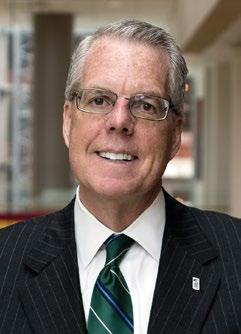
“Learning and innovation go hand in hand. The arrogance of success is to think that what you did yesterday will be sufficient for tomorrow. Innovation is seeing what everybody has seen and thinking what nobody has thought."
— William PollardToday, the University of Maryland School of Pharmacy (UMSOP) is at a truly exciting point in our long, distinguished history since our founding in 1841.
2023 marked the appointment of Sarah L.J. Michel, PhD, as dean of the School. Dean Michel is committed to honoring the remarkable history of the School and to building on our success. As the exclusive home of Pharmapreneurship®, UMSOP is at the forefront of improving and innovating education, research, practice, and patient care to better address the needs of society through the leadership of Dean Michel.
Our faculty, students, staff, and alumni are routinely recognized for their excellence, innovation, leadership, and contributions to health care, science, and humankind. In fact, we’ve shared these success stories in past editions of this publication. Undoubtedly, we will be reading of many future accomplishments of the members of the School community during Dean Michel’s administration.
The many innovations and accomplishments associated with UMSOP throughout our history have often been supported by the generous philanthropy of our friends, collaborators, and alumni. Surely the same will be true as we move forward and lead American pharmacy education in the 21st century.
The very core of our pharmapreneurship initiative is collaborations and partnerships. Please consider supporting the School and Dean Michel’s vision to lead us in serving as the catalyst to transform U.S. pharmacy education by making your gift today. You also can learn more about pharmapreneurship at pharmacy.umaryland.edu/research/pharmapreneurship/.
Thank you to our supporters and friends. We look forward to growth, innovation, and successes yet to come. We do indeed know that what we did yesterday will not be sufficient for tomorrow.
Gratefully,

Ken Boyden, JD, EdD
Associate Dean, Office of Development and Alumni Affairs 410-706-4415 | kboyden@rx.umaryland.edu
The University of Maryland School of Pharmacy honors the lives and memories of the following alumni who passed away between Jan. 1, 2023, and June 30, 2023. We are grateful to each of these alumni for the lasting impact that they made on the School community and the advances they achieved in education, research, or practice.
Alvin M. Blitz, BSP ’67
Joseph V. Brazius, BSP ’57
David L. Craft, BSP ’89
Melvin Friedman, BSP ’58
Burton J. Goldstein, BSP ’53
Richard E. Greenberg, BSP ’57
Guido Guarnaccia, PharmD ’02
Robert J. Kabik, BSP ’57
Stanley B. McCabe, BSP ’67
Robert K. Moler, BSP ’50
Albert Prostic, BSP ’53
Peter Ritterstein, BSP ’74
If you would like to make a memorial gift, please use the enclosed giving envelope or call 410-706-5893.
Michael J. Rombro, BSP ’82
James J. Welsh, BSP ’63

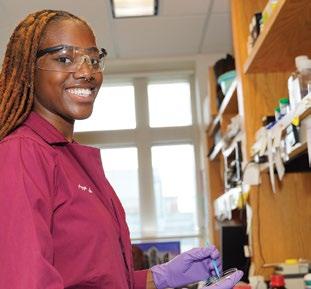



The University of Maryland School of Pharmacy offers 12 highly competitive research-based MS, PhD, and certificate programs that provide students with the knowledge and skills needed to pursue successful careers in the pharmaceutical and health care industries, academia, and the federal government. Online, hybrid, and live.
Graduate Certificates in Palliative Care
Graduate Certificate in Regulatory Science
Graduate Certificate in Medical Cannabis, Therapeutics, and Policy
MS in Medical Cannabis Science and Therapeutics
MS in Palliative Care
MS in Pharmaceutical Health Services Research
MS in Pharmaceutical Sciences
MS in Pharmacometrics
MS in Regulatory Science
PhD in Palliative Care
PhD in Pharmaceutical Health Services Research
PhD in Pharmaceutical Sciences